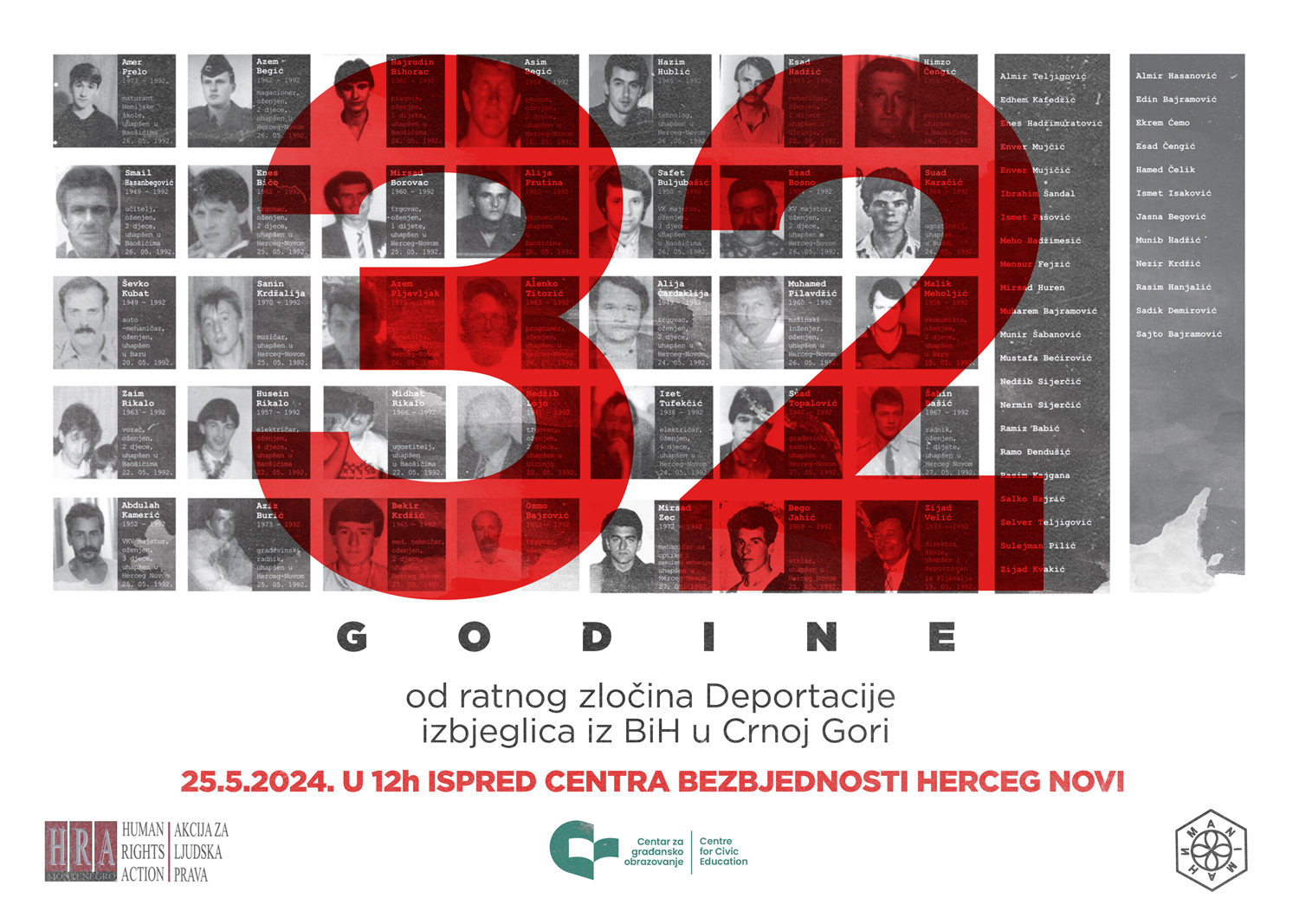
32 years since the crime of Deportation of refugees – invitation to memorial gathering
24/05/2024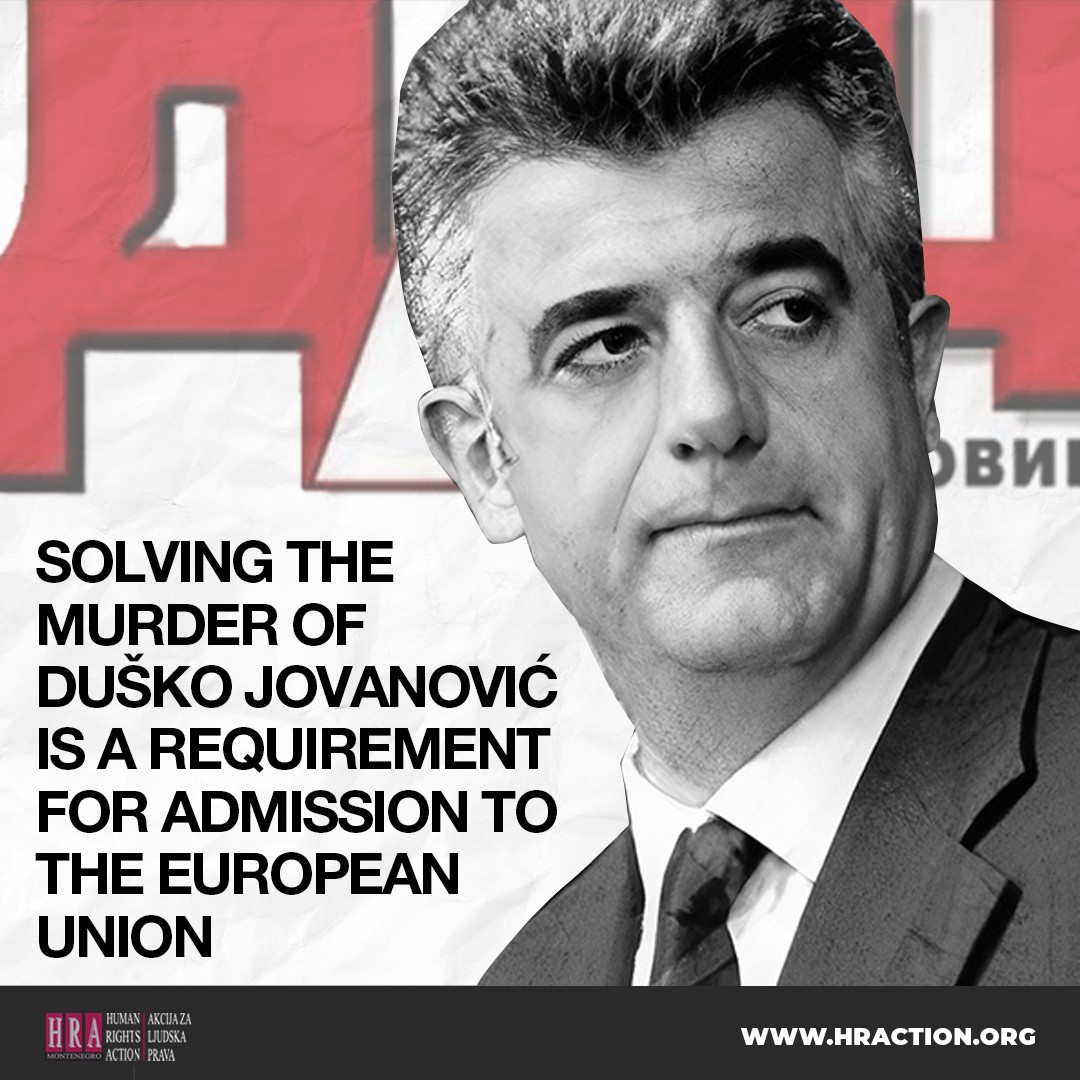
SOLVING THE MURDER OF DUŠKO JOVANOVIĆ IS A REQUIREMENT FOR ADMISSION TO THE EUROPEAN UNION
27/05/2024NGOS COMMEMORATED 32 YEARS SINCE THE UNPUNISHED WAR CRIME OF THE DEPORTATION OF BOSNIAN-HERZEGOVINIAN REFUGEES
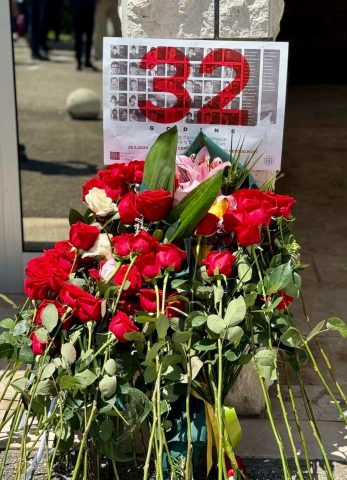
A memorial gathering was held in front of the Security Department of Herceg Novi, today at noon, to commemorate the 32nd year since the war crime of Deportation of Bosnian-Herzegovinian refugees, organised by Human Rights Action (HRA), Centre for Civic Education (CCE), and ANIMA – Center for Peace and Women’s Education, with the attendance of the family of one of the victims of the crime, officials from the Government of Montenegro, representatives of the Islamic Community, non-governmental organizations, media and citizens.
Unfortunately, this anniversary was again marked without the reopening of the criminal investigation, without a monument, and without a Remembrance Day for the victims.
The gathering was attended by Alen Bajrović, the son of the deceased Osman Bajrović, as well as representatives of the Government, including the Protector of Human Rights and Freedoms, Siniša Bjeković, Minister of Culture and Media, Tamara Vujović, State Secretary of Ministry of Internal Affairs, Petar Koprivica, Head of the Security Department in Herceg Novi, Dragan Kontić, Advisor to the Deputy Prime Minister for Labor, Education, Health and Social Policy, Mirjana Maslovar, Official in the Ministry of Foreign Affairs, Drago Martinović, Associate in the Office of the President of Montenegro, Marija Vesković, Manager of the Municipality of Herceg Novi, Dušan Vukić, and Assistant Secretary for Spatial Planning and Construction in the Municipality of Herceg Novi, Aleksandar Božović.
Among the hundred participants were also the Ambassador of Bosnia and Herzegovina in Montenegro, Branimir Jukić, representatives of the Islamic Community, the Bosniak Council, UNDP in Montenegro, political parties (URA, SDP, SD, Bosniak Party, Liberal Party, Democrats), NGOs (Ksena, Civic Alliance, Youth Initiative for Human Rights), activists and citizens of Herceg Novi. The gathering was also attended by representatives of the Center for Nonviolent Action Sarajevo-Belgrade and Documenta from Zagreb.
The gathering was addressed by Bojana Malović, Legal advisor at HRA, Daliborka Uljarević, Executive director of the Centre for Civic Education (CCE), Ervina Dabižinović, coordinator of the Center for Women’s and Peace Education, Alen Bajrović, son of the deceased Osman Bajrović, Aleksandar Saša Zeković, on behalf of non-partisan Civic Initiative “21. maj”, independent councillor in the Assembly of the Capital City Podgorica, Siniša Bjeković, Ombudsman, Petar Koprivica, State Secretary in the Ministry of Internal Affairs, Tamara Vujović, Minister of Culture and Media, Mirsad Rastoder, President of the Executive Board of the Bosniak Council, Velija Murić, lawyer for the families of victims of war crimes, Damir Gutić, Vice-president of the Bosniak Party, Nikola Radman, president of the URA in Herceg Novi, Aleksandar Božović, Assistant Secretary for Spatial Planning and Construction in the Municipality of Herceg Novi, and Sanja Crnić, director of the NGO Ksena.
Bojana Malović from HRA:
… I was born only four years later. Growing up, I was taught that courage is more important than heroism, that the weak are helped in times of need, but most importantly, that people do not betray. Many of my peers still do not know that Montenegro and its police betrayed some of their peers in 1992, that it betrayed a high school graduate, a musician, someone’s father, someone’s son and brother. They betrayed people, especially those who – powerless – sought salvation in her. Our Montenegro sent them to their deaths, and for 32 years it has not been able to gather the courage to punish the perpetrators, to honour the victims, to declare a day of remembrance and to erect a monument to them. We all need a monument, as a promise, as a reminder that this kind of crime and this kind of suffering must never be repeated to anyone. I want to believe that our country can do better and more and that the time will soon come when its authorities will take over the organization of such important commemorations, without being forced to do so by the United Nations or anyone else. Full addressing (in Montenegrin) is available here.
Daliborka Uljarević, Executive director of the Centre for Civic Education:
… There is no dilemma that a functional rule of law is not possible while war crimes, such as Deportation, remain without the established complete factual situation and accountability. Besides the disappointment with the attitude of the competent institutions towards this war crime, we in the civil sector are also disappointed with the proposal of some political structures to name a street in the Capital City Podgorica after the man who is the head of this crime, and we hope that it will not receive the final approval of the competent Ministry because it would that would be an unimaginable insult to these victims, but also a sign that the state of Montenegro stands with the criminals instead of the victims. Full addressing (in Montenegrin) is available here.
Ervina Dabižinović, coordinator of the Center for Women’s and Peace Education ANIMA:
…A survey was conducted among the citizens of Herceg Novi, which showed a high percentage of people who do not know or do not want to know that this event happened here. For 32 years, they insist on the facts, and the fact is one – that civilians were taken from here and that we, as Montenegro, at the national and local level, were certainly in favor of that crime. The fact that the local government does not want to know is a sufficient sign in those 60% of people, who either do not know or are undecided, because they need the facts. What facts do they need? Today we heard the facts. We repeat them every year. The facts are known. We can either to want to know or want not to know. Full addressing (in Montenegrin) is available here.
Alen Bajrović, son of the deceased Osman Bajrović:
…I am the son of Osman Bajrović, who was captured by the Montenegrin police in our family home in Bijela. In May 1992, two uniformed policemen captured my father and took me and my sister in their arms to the police building in front of which we are today. Since then, he disappeared without a trace. For me, this is one big camp and the place of execution of my father. The state did nothing to tell us as victims how it killed, when and who killed my father and where his remains are. I believe that the remains of my father and other people may be in the foundations of this building today, and I base this on the fact that the state has never officially told me where they killed him and how and who killed him. I am bitter because I don’t even know who trapped him in our family home. I expect the Special and Supreme State Prosecutor’s Office to initiate a new procedure, to bring to justice all those who were accomplices with the one who gave the direct order and who was perpetrator of this war crime. And to tells us as victims where and how my father was killed. I also expect the state to return my father’s remains to us as a family so that he can be preserved with dignity. Full addressing (in Montenegrin) is available here.
Aleksandar Saša Zeković, on behalf of the non-partisan Citizens’ Initiative “21 May”, an independent councilor in the Assembly of the Capital City Podgorica:
…We are here today for the sake of memory and truth, which, as the holy apostle Jovan Bogoslov says, remains in us and with us forever. We wish the city of Herceg Novi and all its residents to progress well in everything. The place where we stand and the police building are places of their conscience and of us citizens of Montenegro. The lack of monuments prolongs the trauma of a painful past that belongs to everyone equally. That is why the monument to the victims of deportation will mark the long-awaited humanization and the message that the victims, that is, the dead, still have dignity and deserve the human rights that were arbitrarily and violently taken away from them by the state of Montenegro and its police in 1992.
Siniša Bjeković, Protector of Human Rights and Freedoms of Montenegro:
… These people were left without sin. Their only sin was that they were human beings and that they believed in humans. Perhaps also the fact that they placed the last shred of hope in the great heart of this city, which for centuries was a refuge and a peaceful harbor for many famous and unknown greats and quite ordinary people. All of them were equally devoted to the beauty of this city, its towers and the shores of the most beautiful bay in the world. I guess those mute guardians of this city and all the hills and ramparts that surround it instilled hope and faith in salvation from the whirlwind of a fratricidal war in which people overnight became numbers and certain victims, just because they belonged to a different religion and nation. And they did not agree to a bloody conflict between the same people who only a few days before shared the same fears, the same hopes and the same expectations. Instead, the persecuted and unprotected were sent to death or suffering unworthy of people at the end of the last millennium. Full addressing (in Montenegrin) is available here.
Petar Koprivica, State Secretary in the Ministry of Internal Affairs:
… After 32 years, I believe that Montenegro is obliged to bring this crime to the end, elucidate and determine all the circumstances that led to it, and bring those responsible to justice. That’s the only way we can restore some kind of peace to the families of the victims, turn to some future, but always and always with that idea, that it never happens again. I want to send also another very important message. In the Balkans, where there are turbulent times, where we live at the crossroads of all religions, nations, cultures, the security system of Montenegro must never and will not be put at the service of what we, unfortunately, have gathered here today.
Tamara Vujović, Minister of Culture and Media:
… I am from Herceg Novi and today is my first time here. You have been gathering in this place for 13 years, and I am here for the first time as the Minister of Culture and Media of Montenegro and as a woman from Herceg Novi… Facing war crimes, especially those related to your city or fellow citizens, is really not easy. I feel sorry for all the victims. Kudos to all the victims, and thank them for not choosing a rifle, but that they have decided to escape from the war and seek refuge in a free and safe territory. I am sorry that it is the territory of the municipality of Herceg Novi from which they were taken. It is our duty to talk about this crime, to face it and to teach future generations what happened here. That’s the only way we can move on…
Mirsad Rastoder, President of the Executive Committee of the Bosniak Council:
I am calling on the great artists who gave Herceg Novi its soul and raised it to a city where people are happy to come, to help the people of Herceg Novi to find that line, the thin line, between good and evil and to find the strength to found a monument for civilian victims of deportation in the city. I was also encouraged by the fact that the head of the Security Center invited me for coffee, and this is a sign to me that there is hope for all of us. With my wrinkles, I testify that it is not easy to awaken the sleeping conscience of our society, but the least we can do is to establish a day of remembrance, to erect a monument, for the state authorities to do what is necessary, to personalize this investigation, accusation and responsibility, to find basic information about war crimes in textbooks, so that our children don’t leave blind and only find out at the age of 25 that some crime has happened. Full addressing (in Montenegrin) is available here.
Velija Murić, lawyer for the families of victims of war crimes:
… This crime is a dark stain in our history, and the memory of the victims reminds us of the importance of fighting for human rights and justice. I’ve been dealing with human rights for three decades and I’ve witnessed many injustices, but every time I stand in front of people and talk about those terrible times, I’m overcome by human bitterness with the ever-repeated question – is it possible, where does such an unjustified and unreasonable anger of man against man come from – unfortunately, I still don’t have an answer. We must not forget that forgetting is the greatest enemy of justice. It is our duty to remember and teach future generations about these events. Only through remembrance and recognition of the truth can we ensure that such crimes never happen again. Full addressing (in Montenegrin) is available here.
Damir Gutić, vice-president of the Bosniak Party:
… It is devastating, it is scandalous that 66 people were taken away from here. It is known that only 12 survived the torture and that it is not known what happened to 54 citizens, and that the state of Montenegro did nothing about it. This is a heavy stain on the face of Montenegro, and all of us as a society must do everything to fix it, so that through the verdicts and through the achievement of justice, the souls of the deceased will find peace in some way. We call on the Government, the executive power, to introduce the topics of war crimes into educational programs through the Ministry of Culture and the Ministry of Education. It is devastating that many young people do not know about these topics, they do not know how many war crimes took place on the territory of Montenegro. Full addressing (in Montenegrin) is available here.
Nikola Radman, president of URA in Herceg Novi:
First and foremost, are we as a society mature at all and are we really inheriting universal values or are we just fooling around?! Are we as a society ready to close chapters 23 and 24? I don’t think we are. Have we as a society come out of the nineties? We didn’t. And why didn’t we? We cannot bypass justice. And these are the basic reasons why we are forced to gather here for years and fight to make a very simple decision to place a memorial at this place of a crime. All our continuous gatherings and stories become redundant and pointless – we have to move from words to actions. Full addressing (in Montenegrin) is available here.
Aleksandar Božović, Assistant Secretary for Spatial Planning and Construction in the Municipality of Herceg Novi (spoke as a citizen):
People were killed, Alen’s father was killed… But we have been killing the truth for 32 years. It is true that there are masterminds, but they disappear over time… Montenegro also had war master. The biggest master of war is not alive, he was the president of the country. But the Prime Minister of that time is alive, for many years… The Minister of Internal Affairs of that time is also alive. We do not mention their names. Their names are Slobodan Milošević, Momir Bulatović, Milo Đukanović, Nikola Pejaković and that’s the end of it. The rest were minor officials who could not decide on the lives of Alen’s father and everyone else. Full addressing (in Montenegrin) is available here.
Sanja Crnić, director of NGO Ksena:
No war has a winner and in war we are all victims. However, the biggest victims are the innocent victims. It is true that there is no collective responsibility for what happened. There are individuals who should be punished. I also now want to protect the citizens of Herceg Novi from collective responsibility. Because it must be known who is the perpetrator of all this and they must be brought to justice.
Unofficial, civic Montenegro has been honouring the victims of this war crime every year for 20 years, and this is the 15th memorial gathering in front of the police building in Herceg Novi, where the largest number of illegally arrested civilians from Bosnia and Herzegovina were handed over to the army of the Republic of Srpska. This year too, we do not allow the victims of this war crime to be forgotten, we demand the determination of criminal responsibility and a worthy memorial for the victims.
FACTS
We remind that in May and June 1992, according to available official documents, the Montenegrin police illegally arrested at least 66 Muslims from Bosnia and Herzegovina (or persons presumed to be of Muslim nationality), who fled to Montenegro from the war in Bosnia. These individuals were handed over to the enemy army of the Republic of Srpska in Bosnia, which liquidated majority of them. Only twelve managed to survive deportation to concentration camps. Simultaneously, 33 refugees from Bosnia of Serbian nationality were also arrested in Montenegro and returned to the Republic of Srpska for mobilization. Unlike the deported Muslims, the deported Serbian refugees were not treated as hostages, and none of them are known to have died as a direct result of the deportation.
Most arrested refugees were brought to the Security Center of Herceg-Novi, which served as a collection centre. From there, they were transported by buses on 25 May to the KPD Foča concentration camp, and on 27 May to an undisclosed location in eastern Bosnia, within the territory of the then Republic of Srpska (later named Republic of Srpska). All Muslims deported by bus on 27 May 1992, were likely killed the same day, and their bodies were thrown into the Drina River. The remains of all victims have still not been found. Other Muslim refugees were also arrested at the end of May 1992 in Bar, Podgorica, or near the border with Bosnia and were individually deported directly to the Foča camp or handed over to agents of the Republic of Srpska, after which their traces were lost.
THREE INITIATIVES
HRA, CCE, ANIMA and then a member of the Council for Citizen Control of Police Work, Aleksandar Saša Zeković, thirteen years ago, in 2011, submitted three initiatives:
- To the former President of the Montenegrin Parliament, Ranko Krivokapić, and all the heads of parliamentary clubs, to declare a Remembrance Day for the victims of the deportation crime in 1992;
- To the former Prime Minister of Montenegro, Igor Lukšić, the Minister of Internal Affairs, Ivan Brajović, the Minister of Culture, Branislav Mićunović, and the former President of the Municipal Assembly of Herceg Novi, Dejan Mandić, to erect a memorial monument to the victims of the deportation of refugees in 1992 in front of the Police Administration Station in Herceg Novi, thus supporting the wishes of the families of the deceased victims;
- Fot the Montenegrin police to issue an apology for the illegal arrest and extradition of refugees to the hostile army of the Serbian Republic of Bosnia and Herzegovina.
We have been repeating these initiatives for years, so in May 2021, we repeated the first initiative to the then President of the Parliament of Montenegro, Aleksa Bečić, who replied that the Law on State and Other Holidays should be changed for this purpose, but he did nothing to initiate its change.
We repeated the second initiative in September 2021 to the President of the Municipality of Herceg Novi, the President of the Municipality Assembly Herceg Novi, Ivan Otović, the committee clubs of the Municipality Assembly Herceg Novi and the then Minister of Education, Science, Culture and Sports, Vesna Bratić. We have not received any response from them. This year, together with the Bosniak Council, we sent the same initiative to the President of the Municipality Herceg Novi, Stevan Katić, and the President of the Municipal Assembly, Ivan Otović, and to all councilors in the local parliament of Herceg Novi, from whom we have not received any response to date.
The third initiative was the only one accepted in 2022, when the Director of the Police Directorate Zoran Brđanin and Minister Filip Adžić attended a memorial gathering in Herceg Novi on the occasion of thirty years since the crime and issued a public apology to the victims and victims’ families for the actions of the Montenegrin police.
- Bojana Malović, legal advisor in HRA
- Daliborka Uljarević, executive director of the Center for Civic Education
- Ervina Dabižinović, coordinator of the Center for Women’s and Peace Education ANIMA
- Alen Bajrović, son of the deceased Osman Bajrović
- Siniša Bjeković, Protector of Human Rights and Freedoms of Montenegro
- Aleksandar Božović, Assistant Secretary for Spatial Planning and Construction in the Municipality of Herceg Novii
- Aleksandar Saša Zeković, on behalf of the non-partisan Citizens’ Initiative “21 May”, an independent councilor in the Assembly of the Capital City Podgorica:
- Tamara Vujović, Minister of Culture and Media
- Damir Gutić, vice-president of the Bosniak Party
- Mirsad Rastoder, President of the Executive Committee of the Bosniak Council
- Petar Koprivica, State Secretary in the Ministry of Internal Affairs
- Nikola Radman, president of GP URA in Herceg Novi
- Velija Murić, lawyer for the families of victims of war crimes
- Sanja Crnić, executive director of the NGO Ksena
- Tea Gorjanc Prelević, executive director of the HRA
- Valentina Minic, Democrat of Montenegro
- Džemal Dacić, Head of the Reis Cabinet of the Islamic Community
- Samir Kardibasic, Islamic Community
- Mirjana Maslovar, adviser to the Deputy Prime Minister for work, education, health and social policy
- Admir Adrović and Mirsad Rastoder, Bosniak council
- Dragan Kontić, head of the Security Department in Herceg Novi
- Vatroslav Belan and Esad Šahinović, Liberal Party
- Branimir Jukić, Ambassador of Bosnia and Herzegovina to Montenegro
- Alen Bajrović, son of the deceased Osman Bajrović, with his family


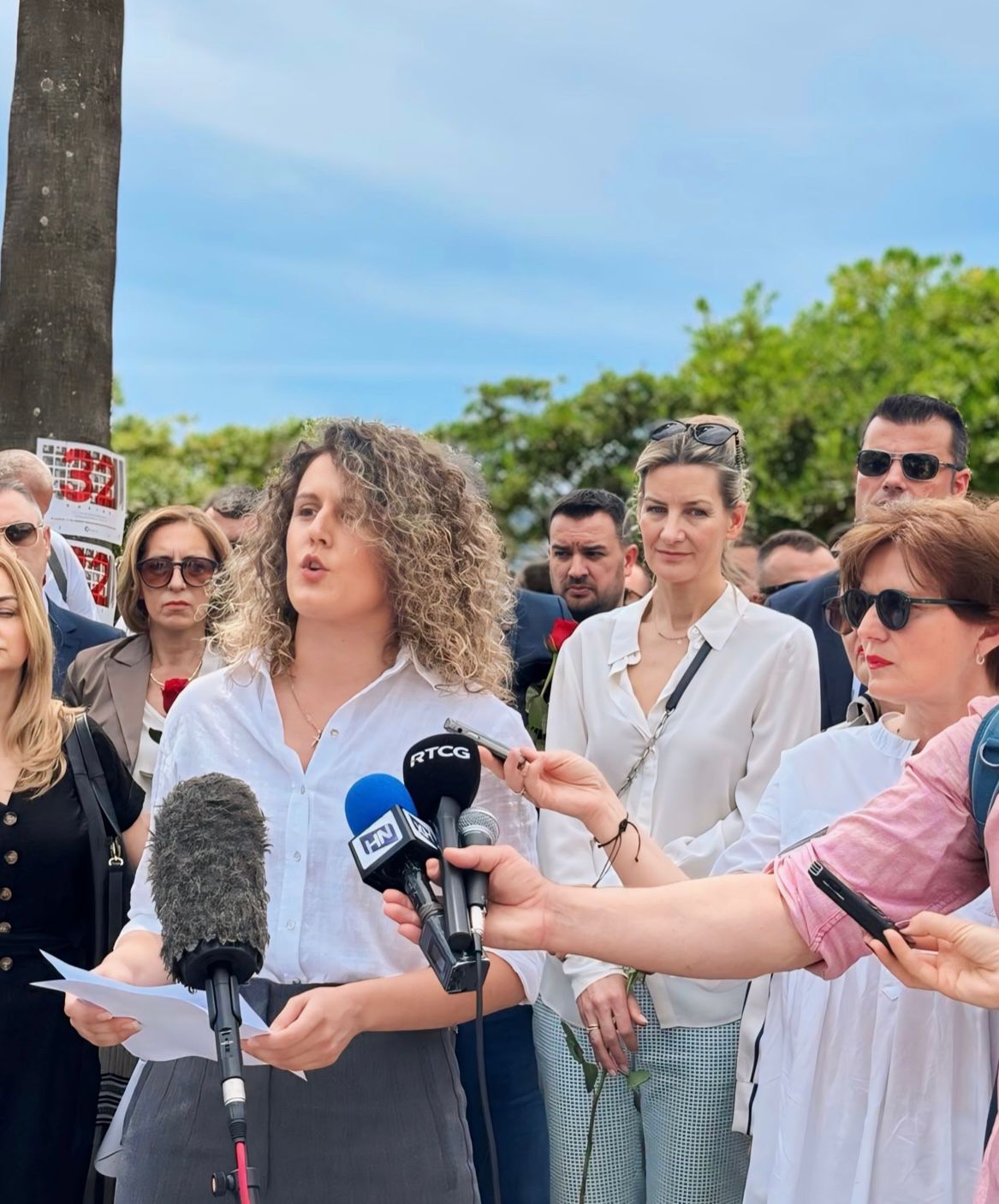
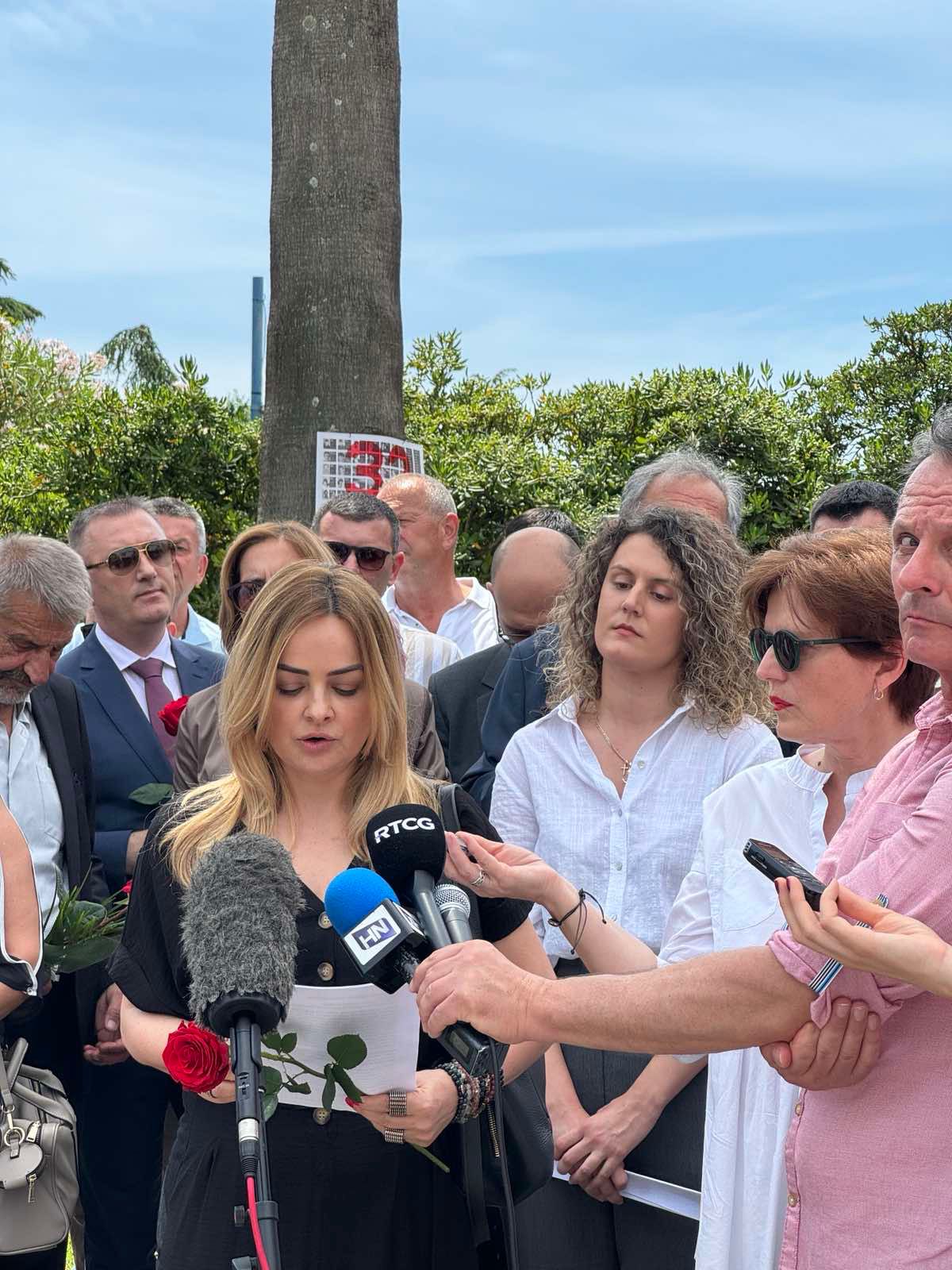
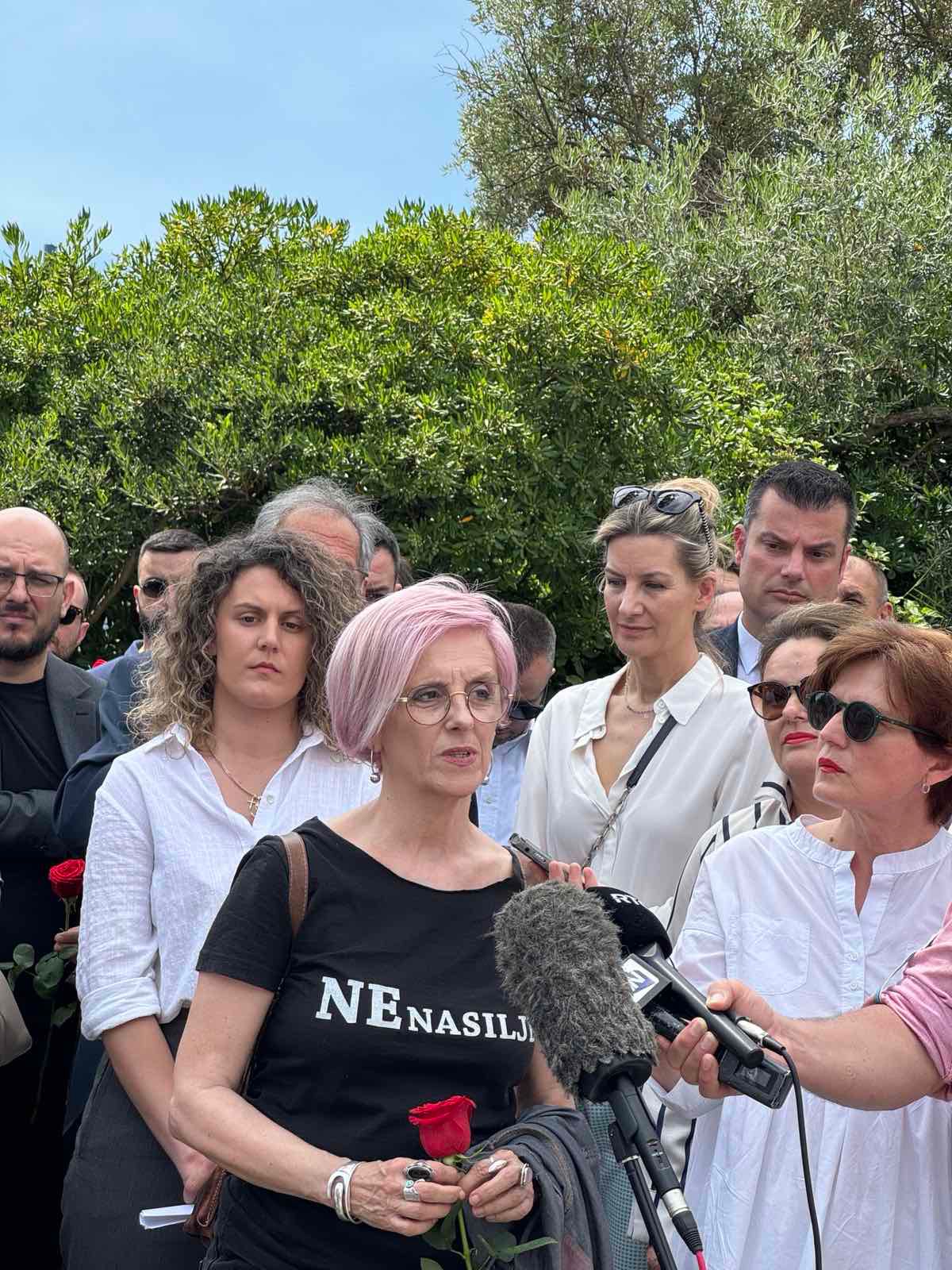

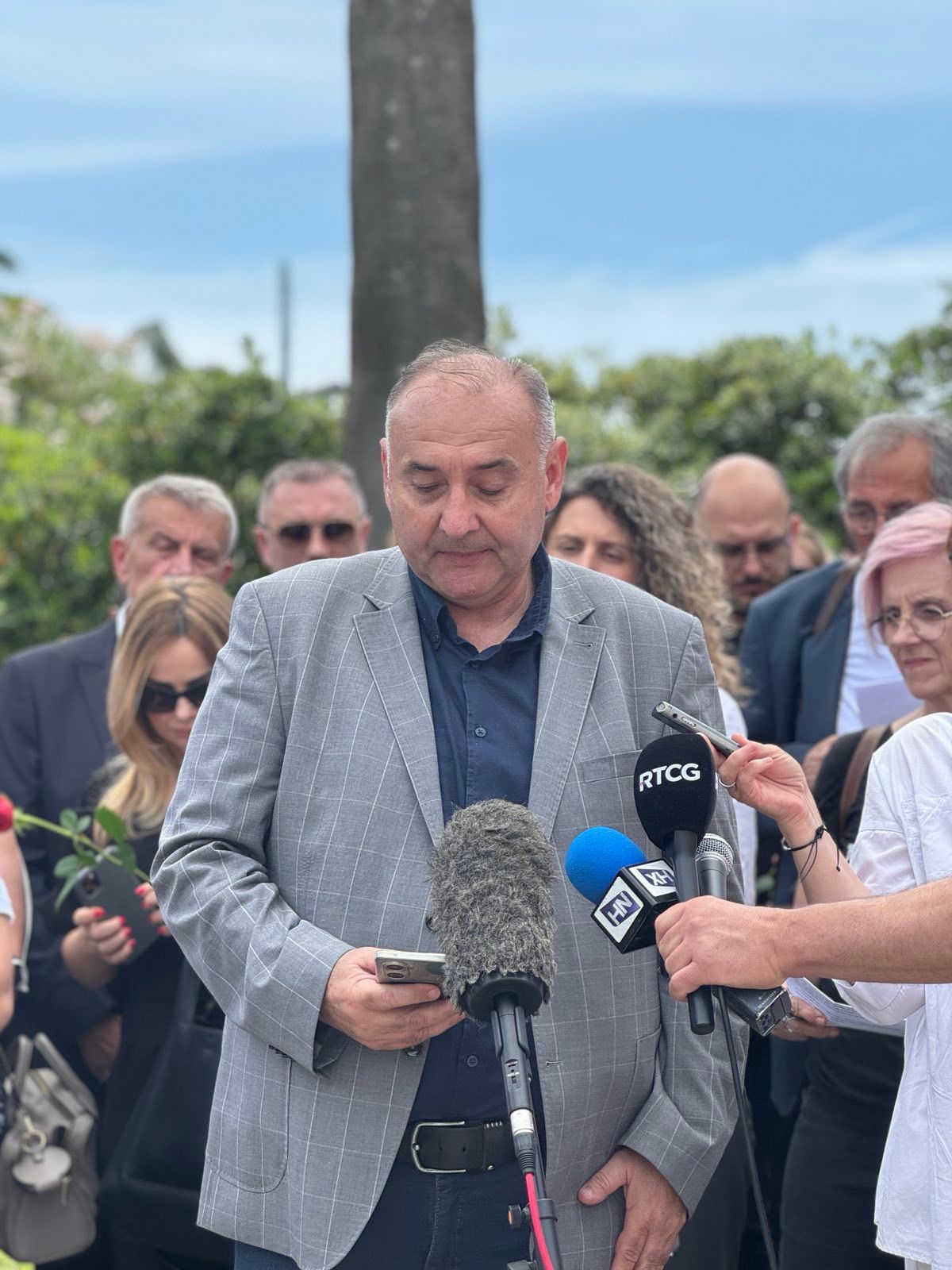
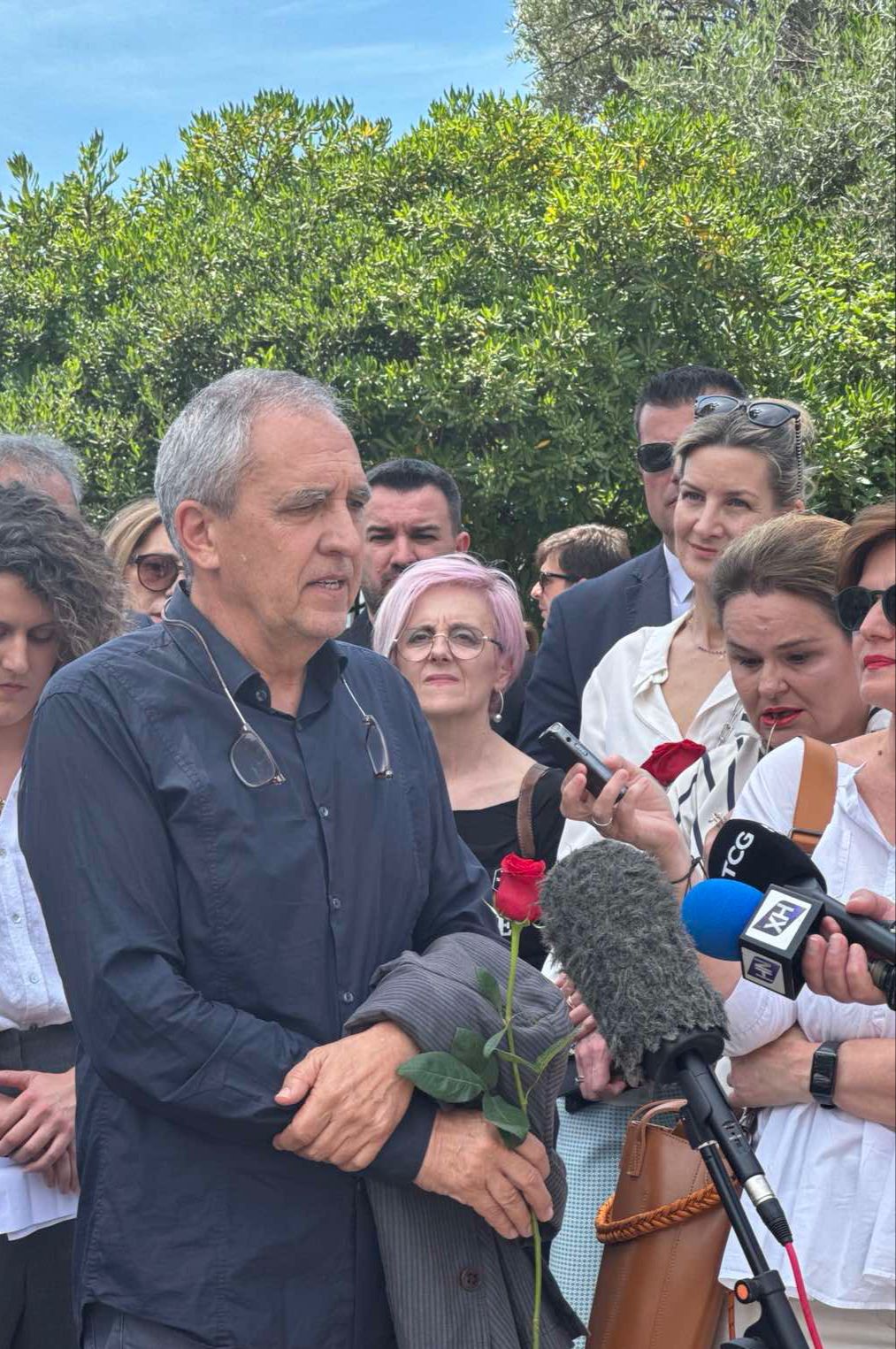
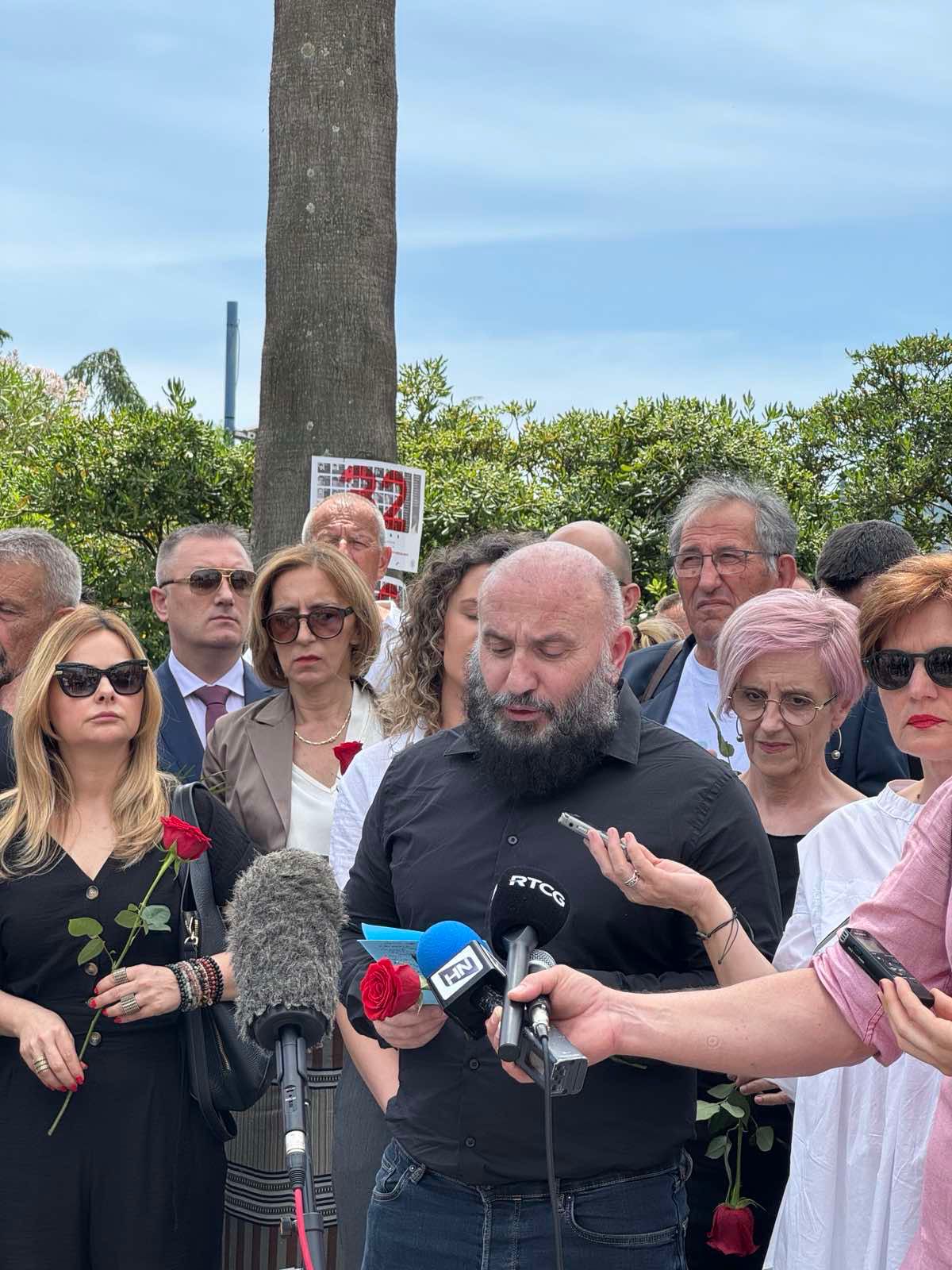
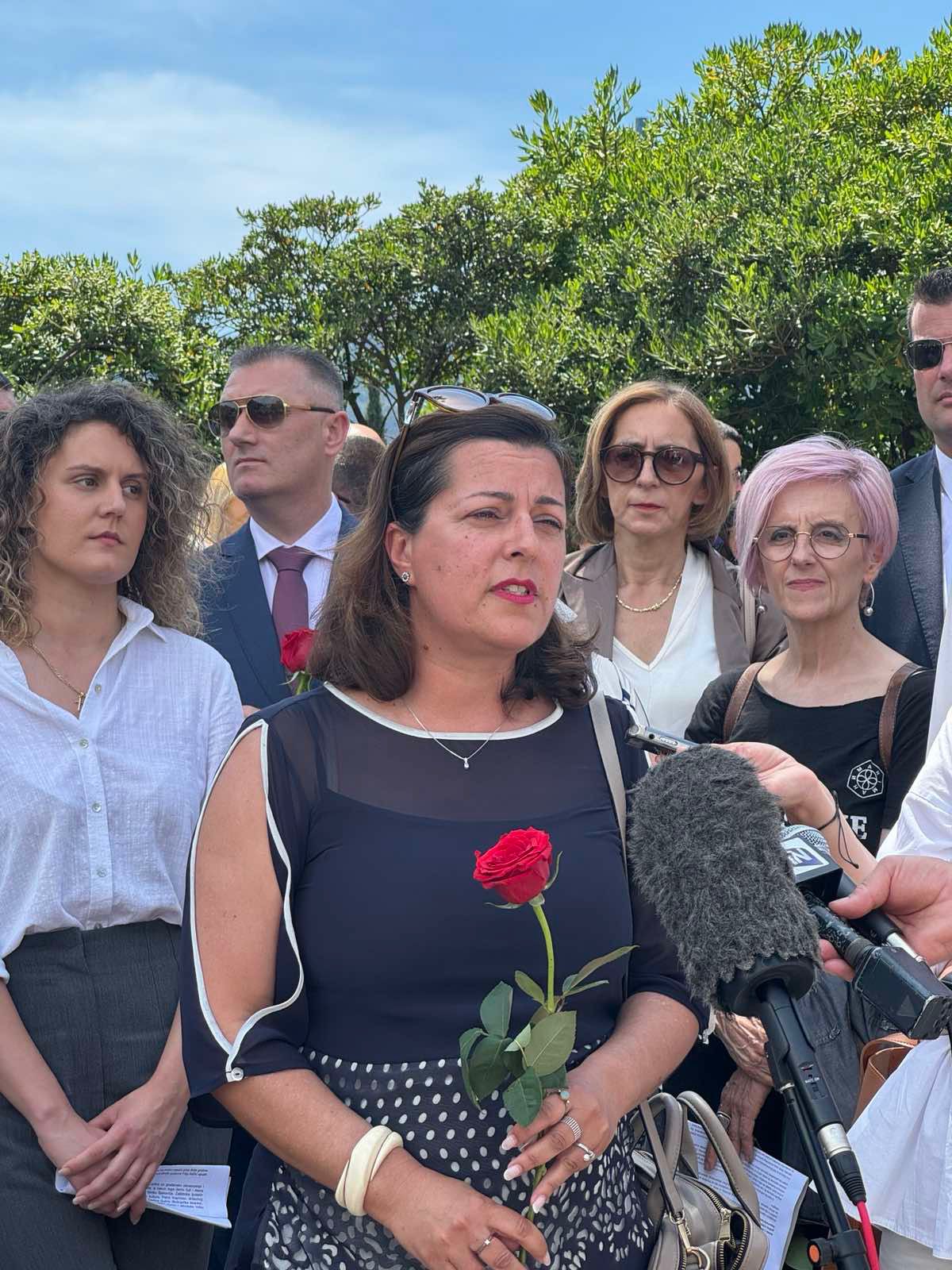
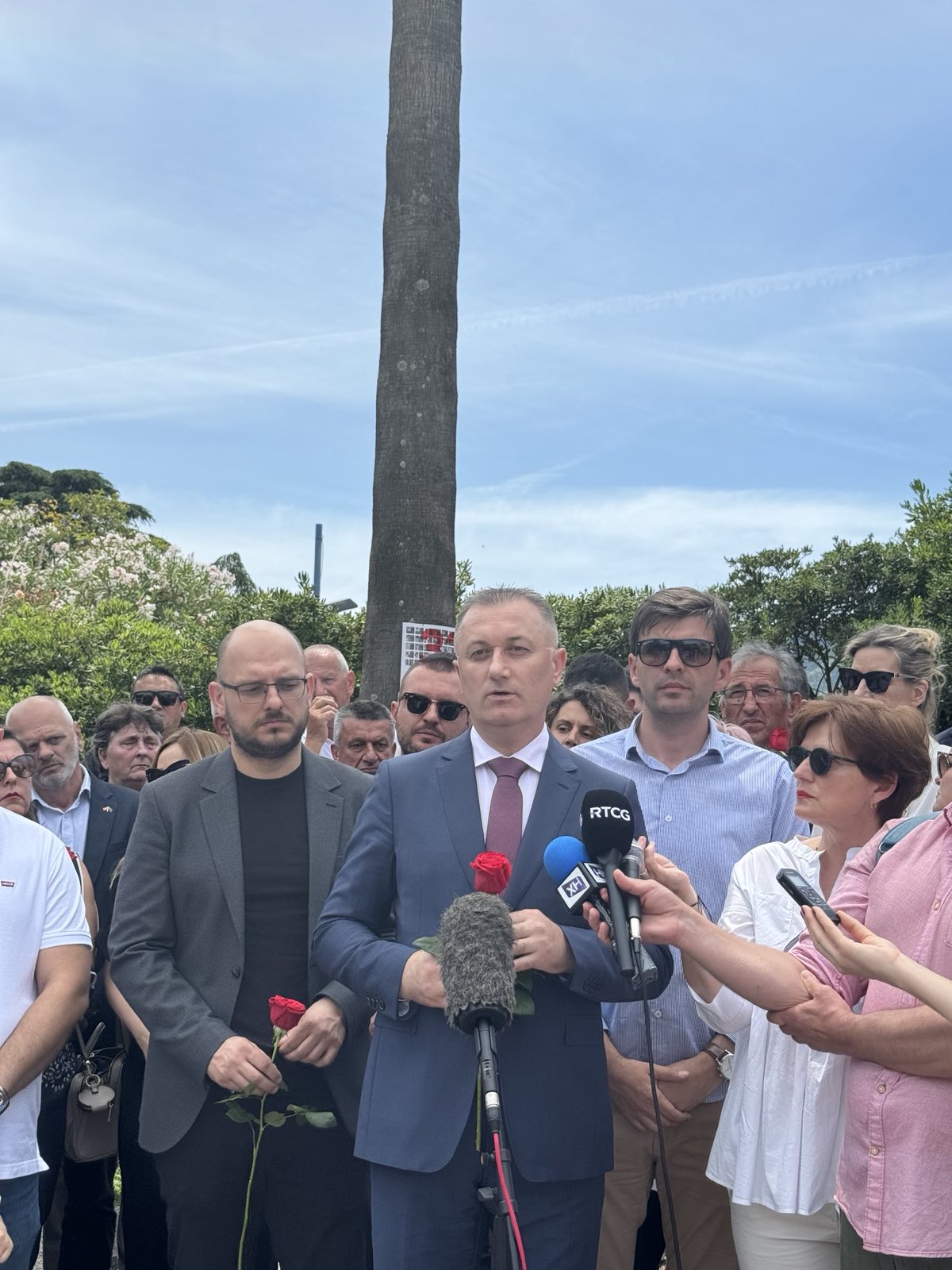
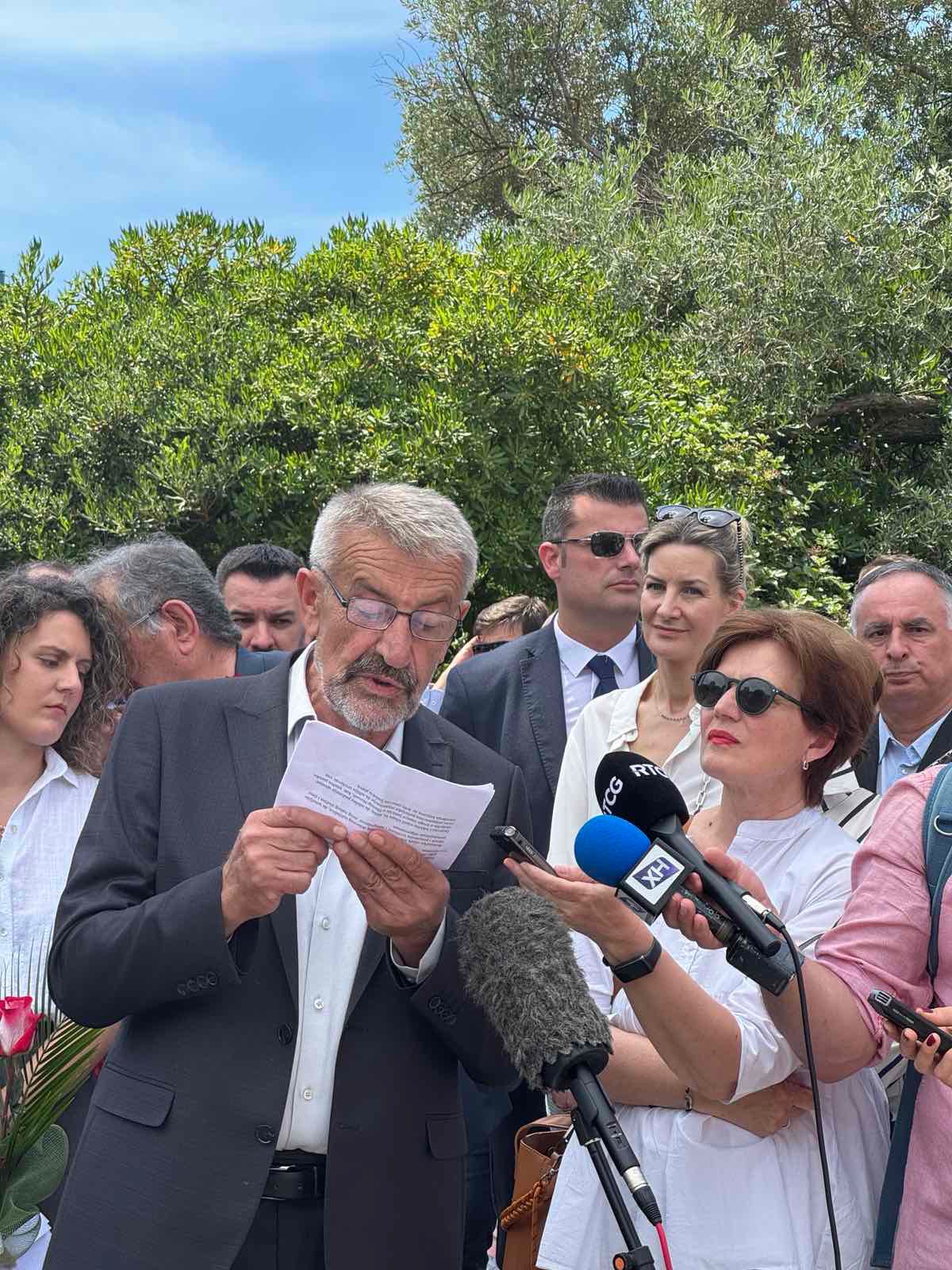
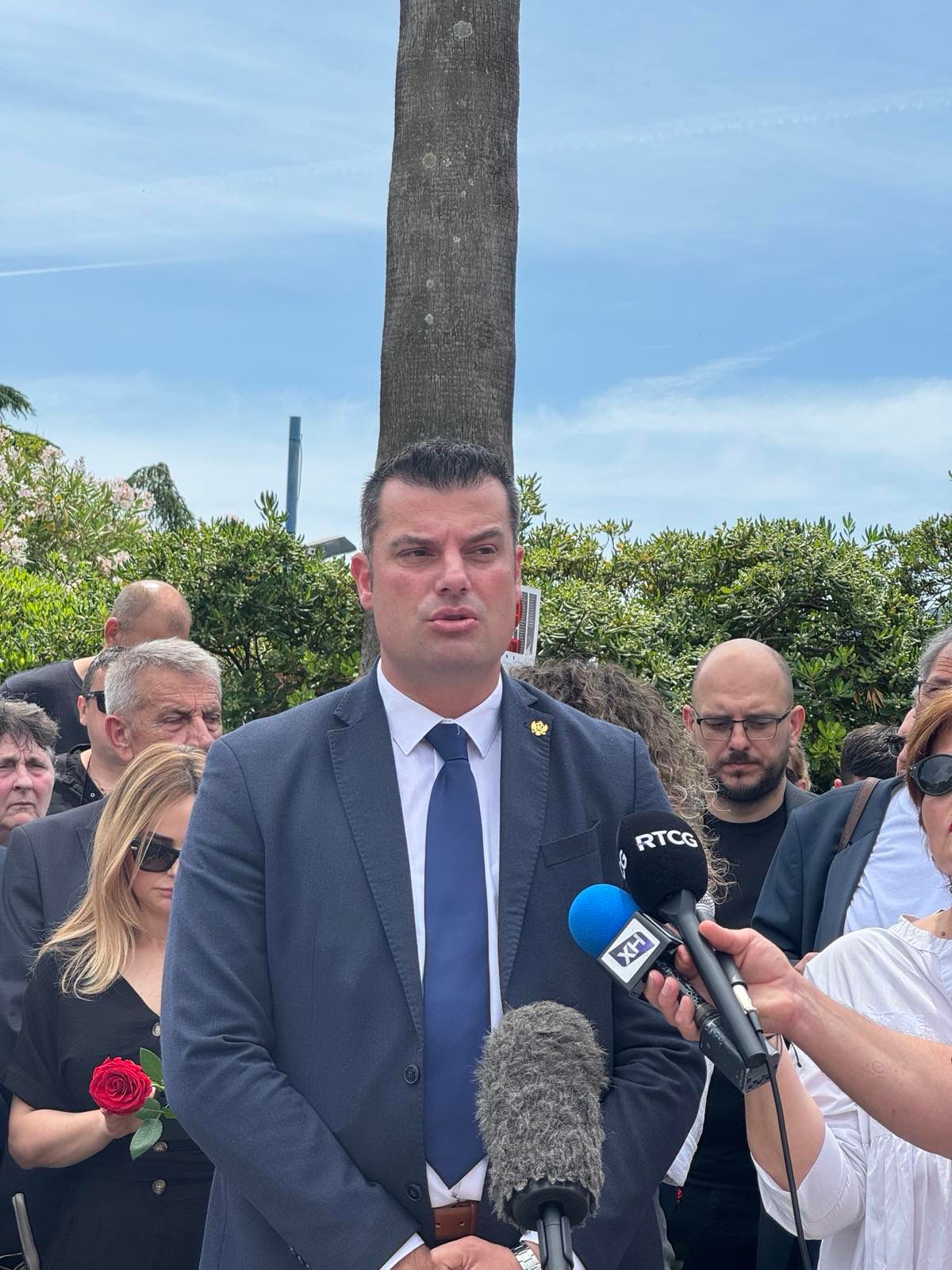
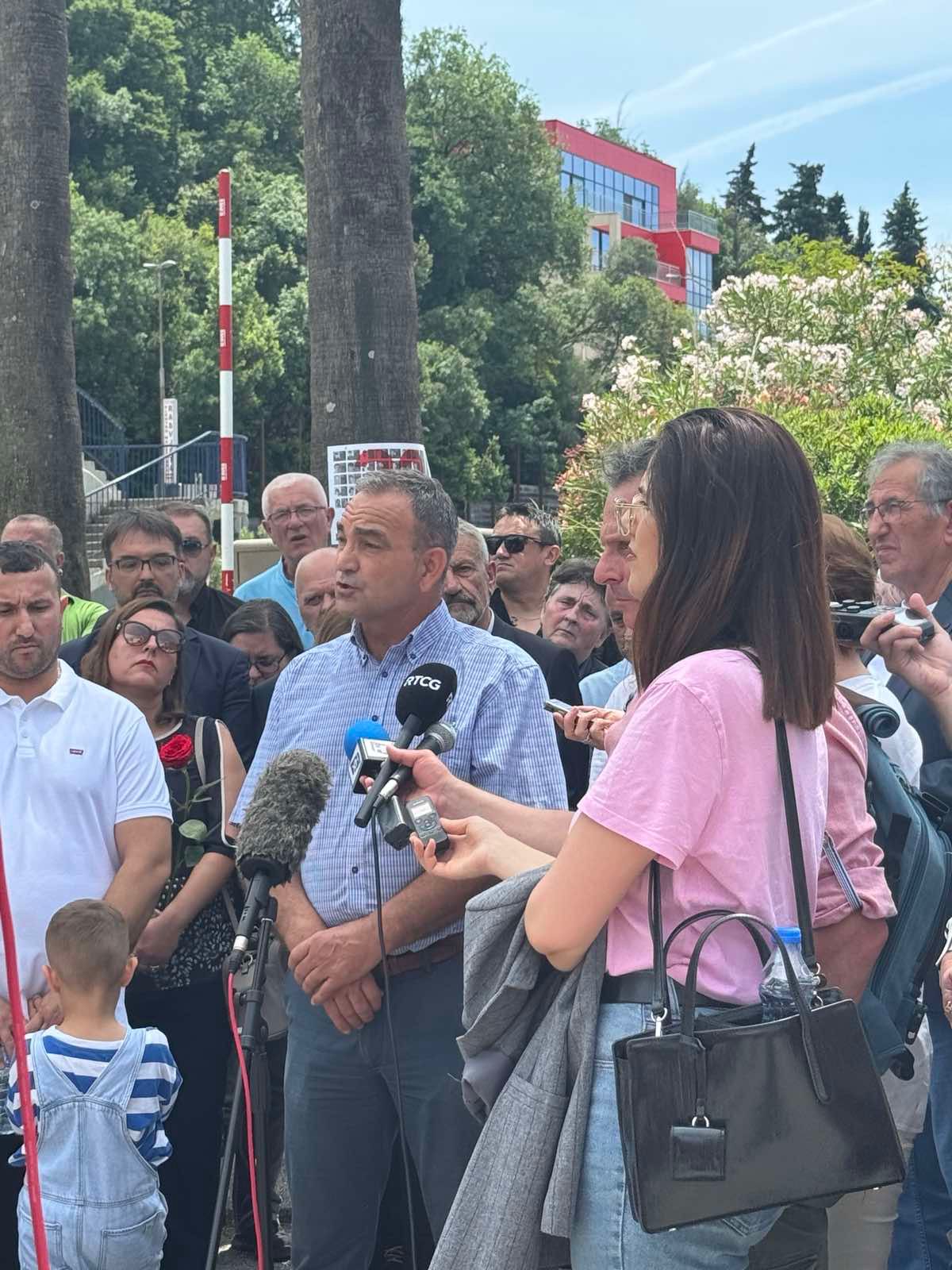

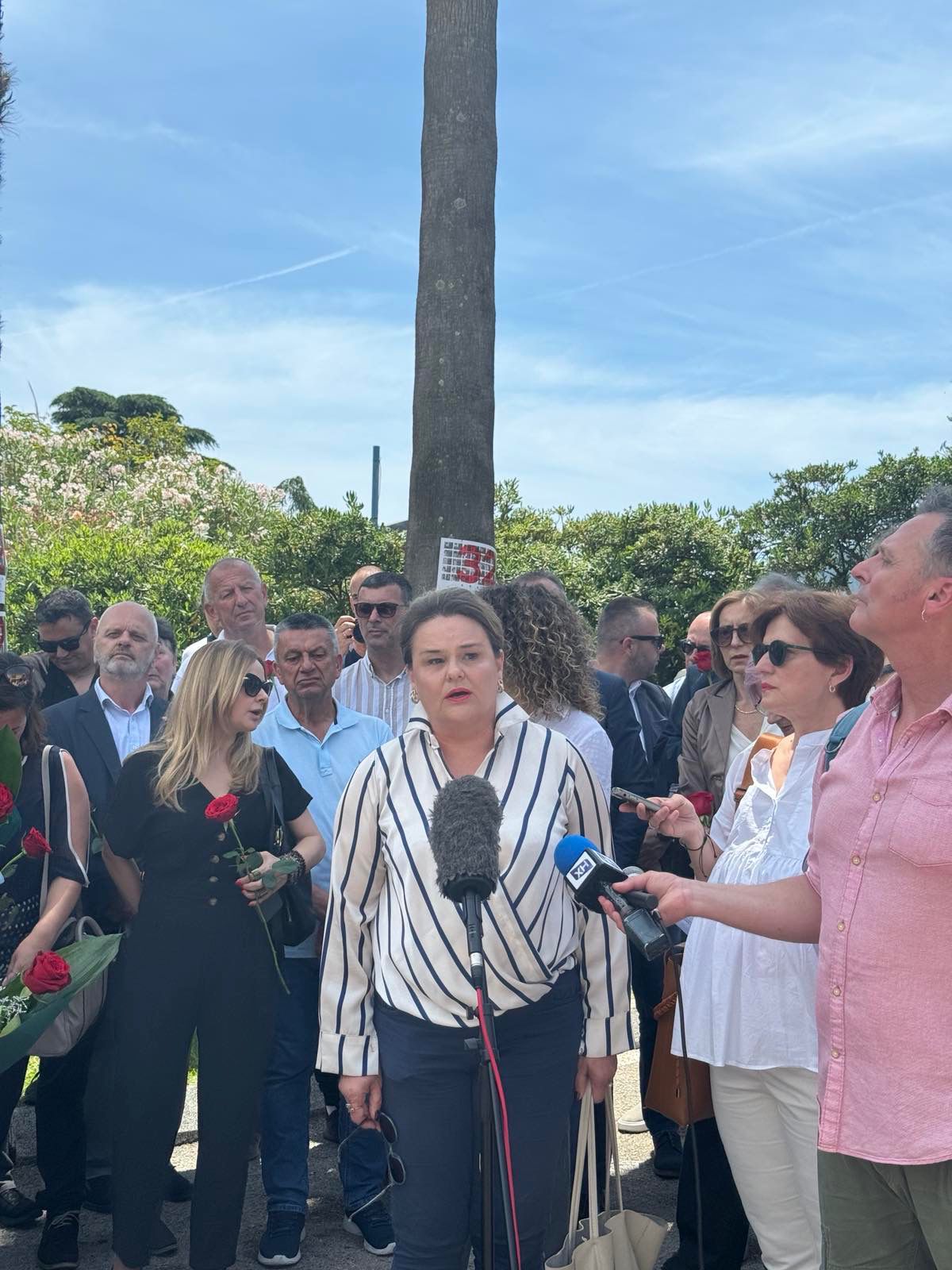
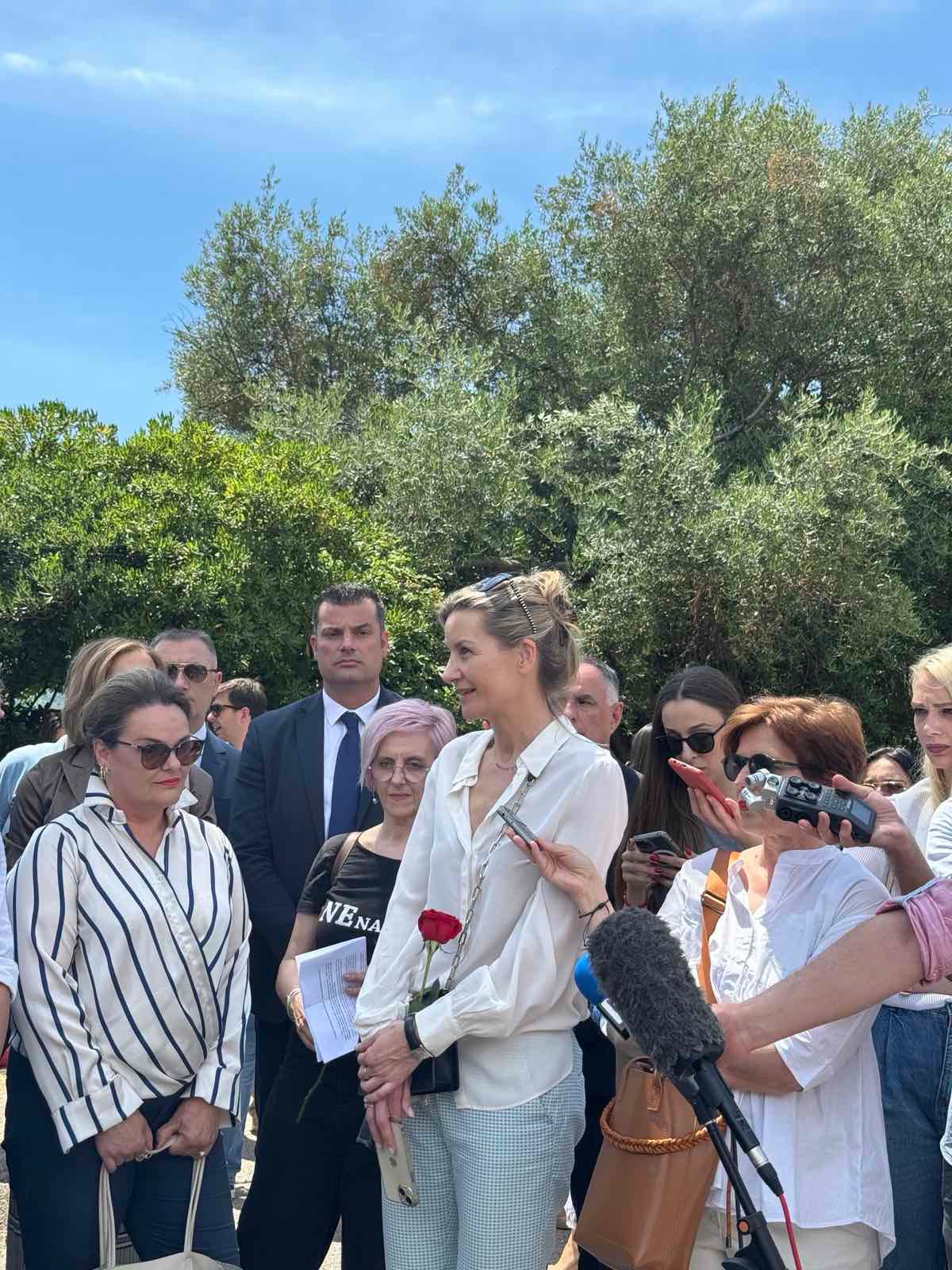
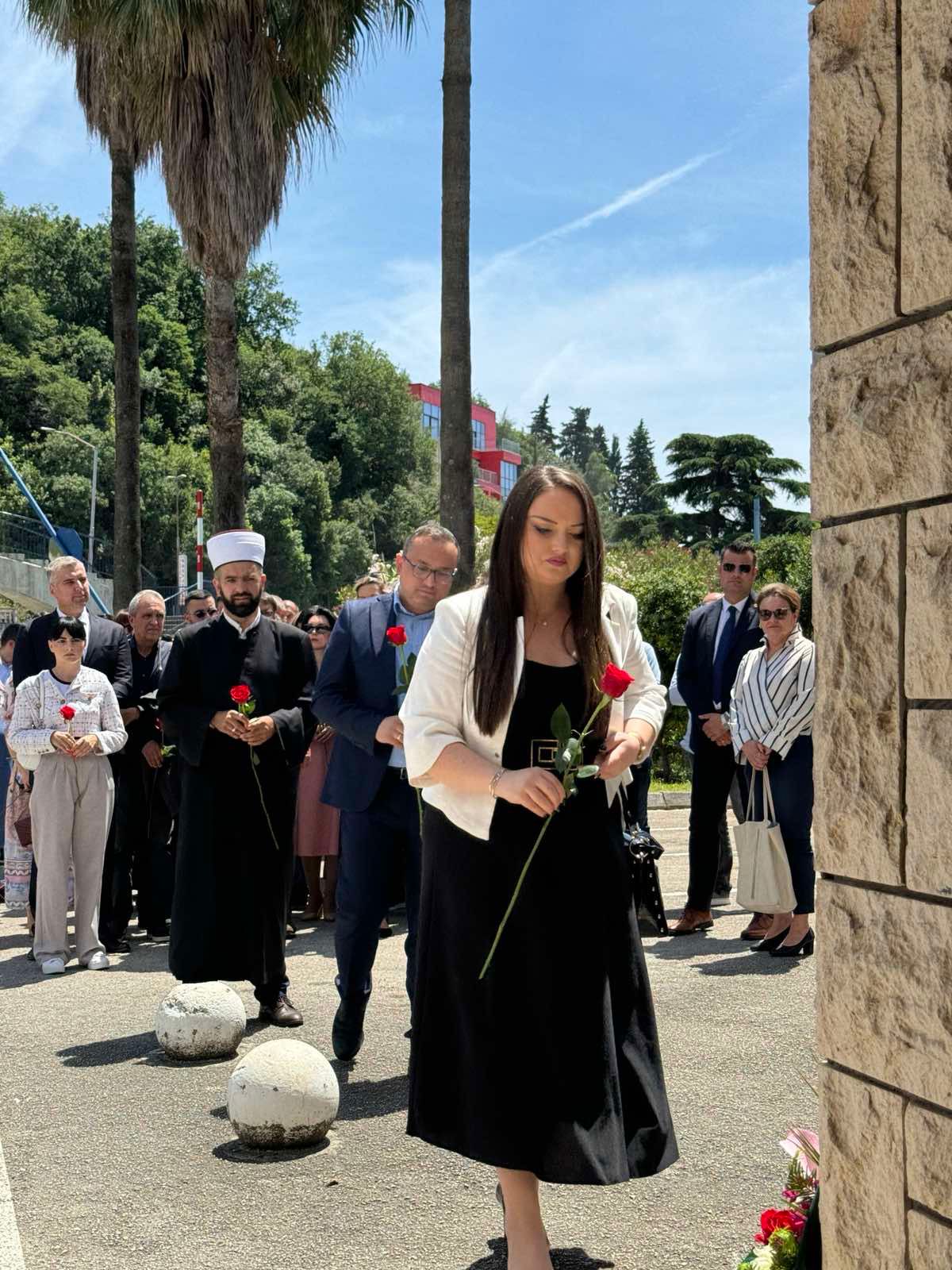
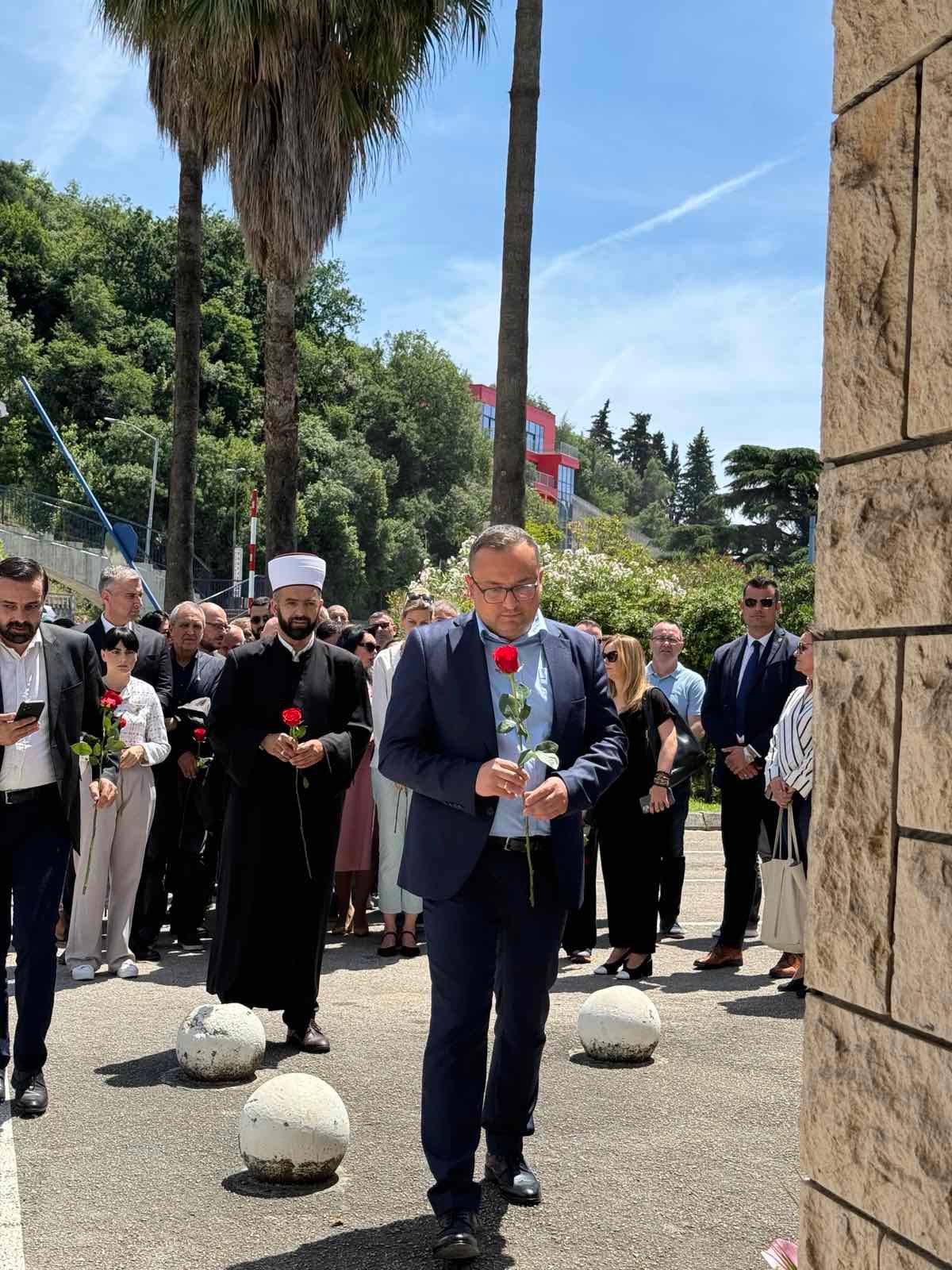
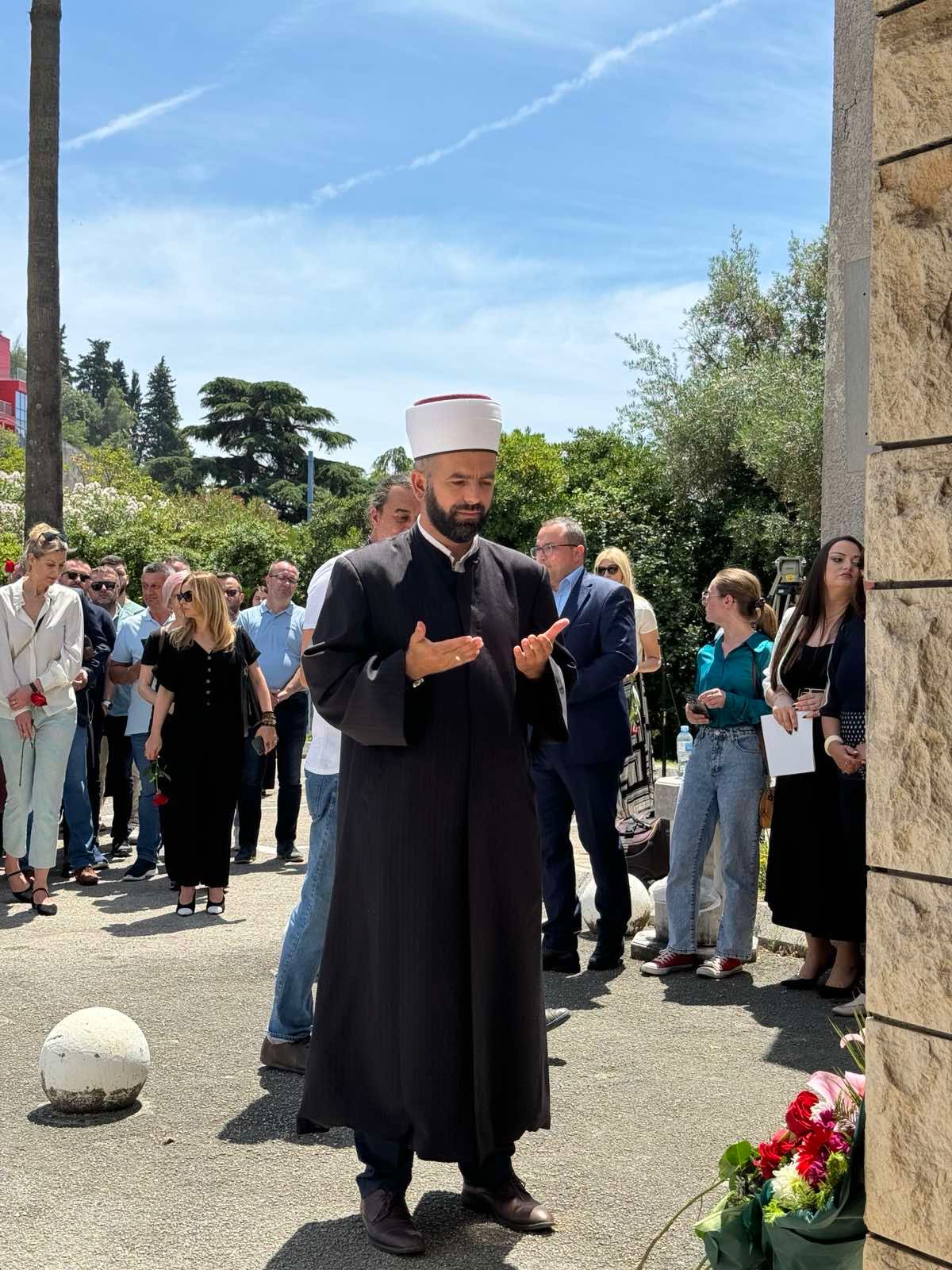
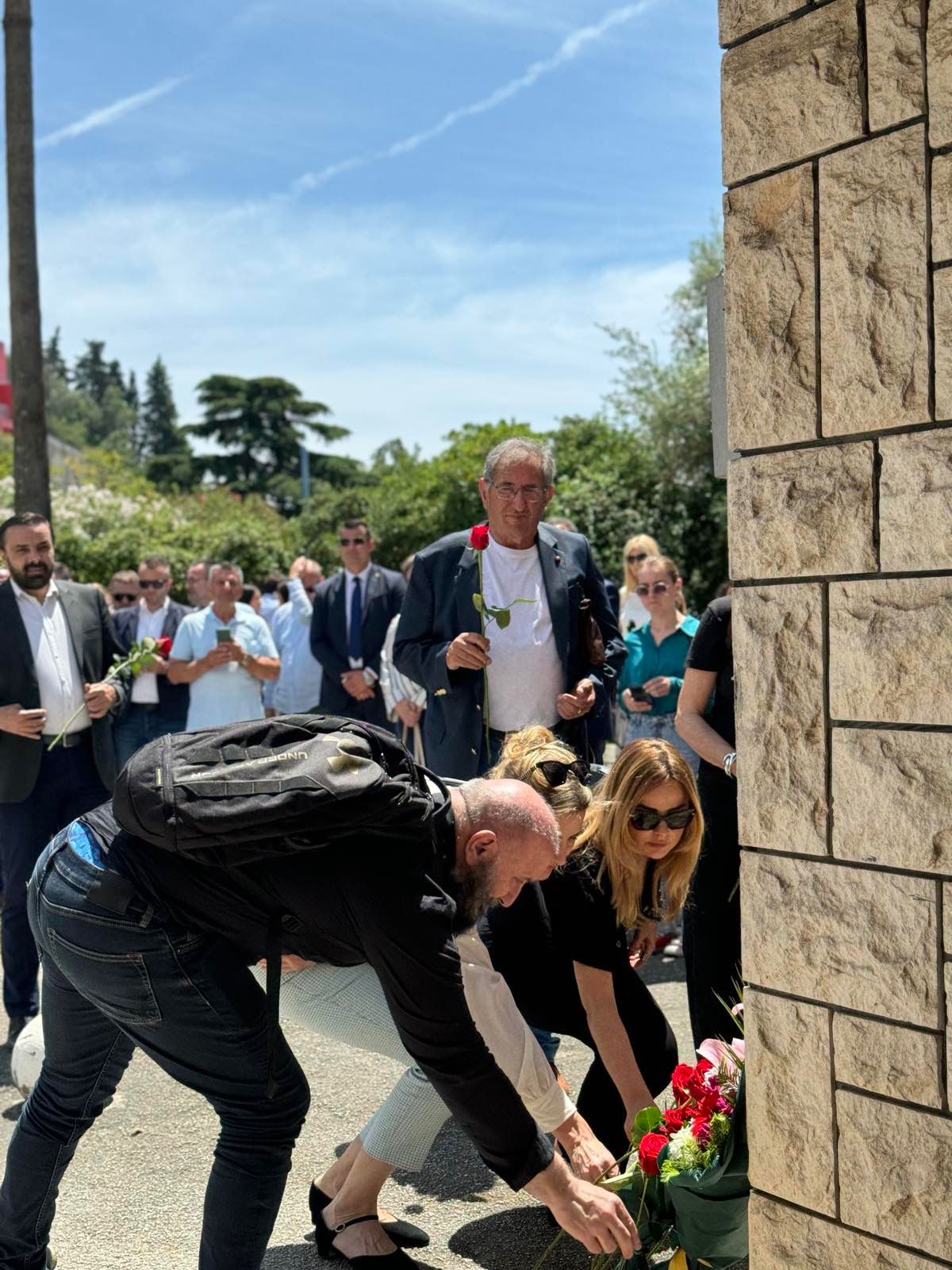
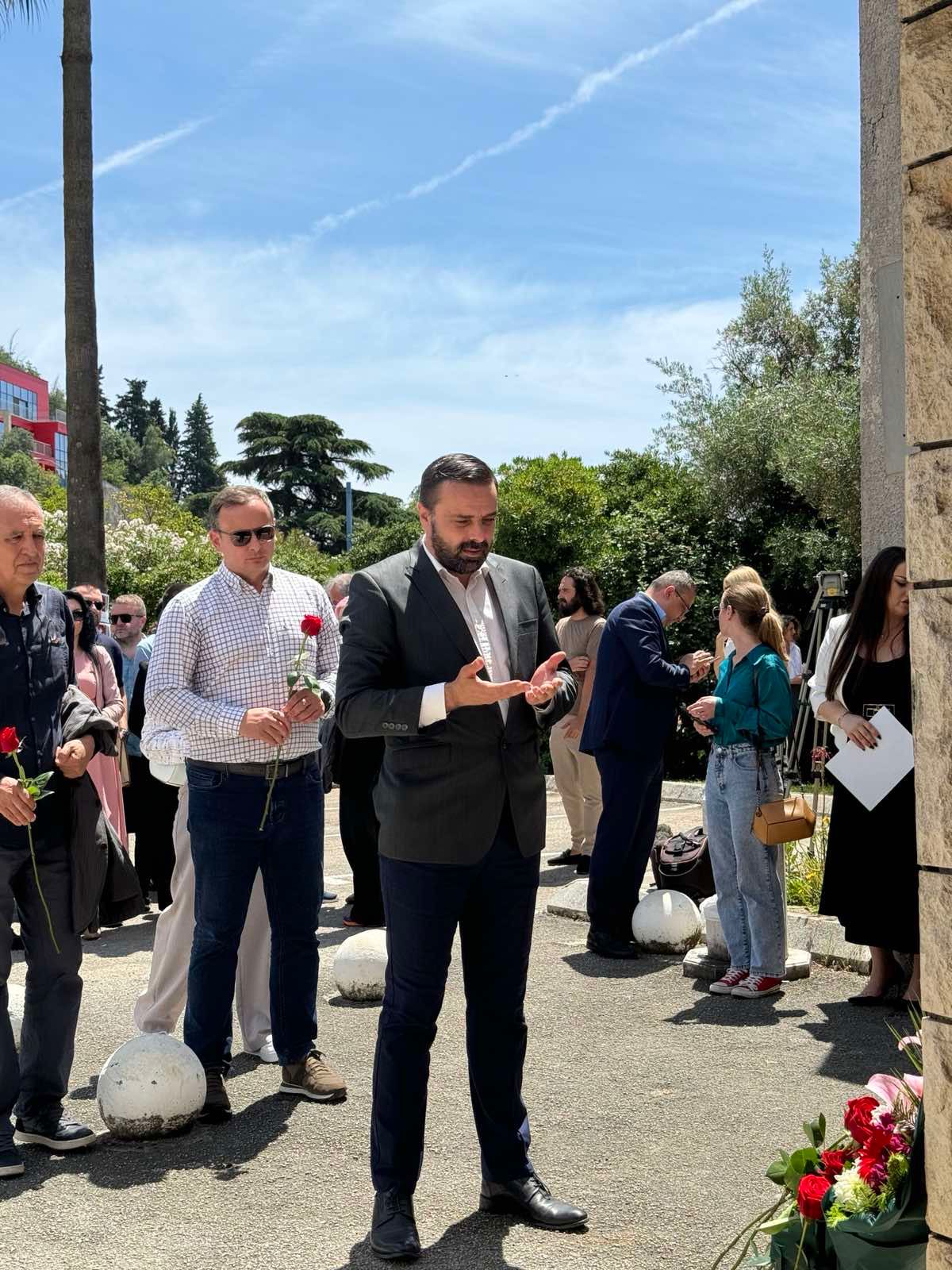
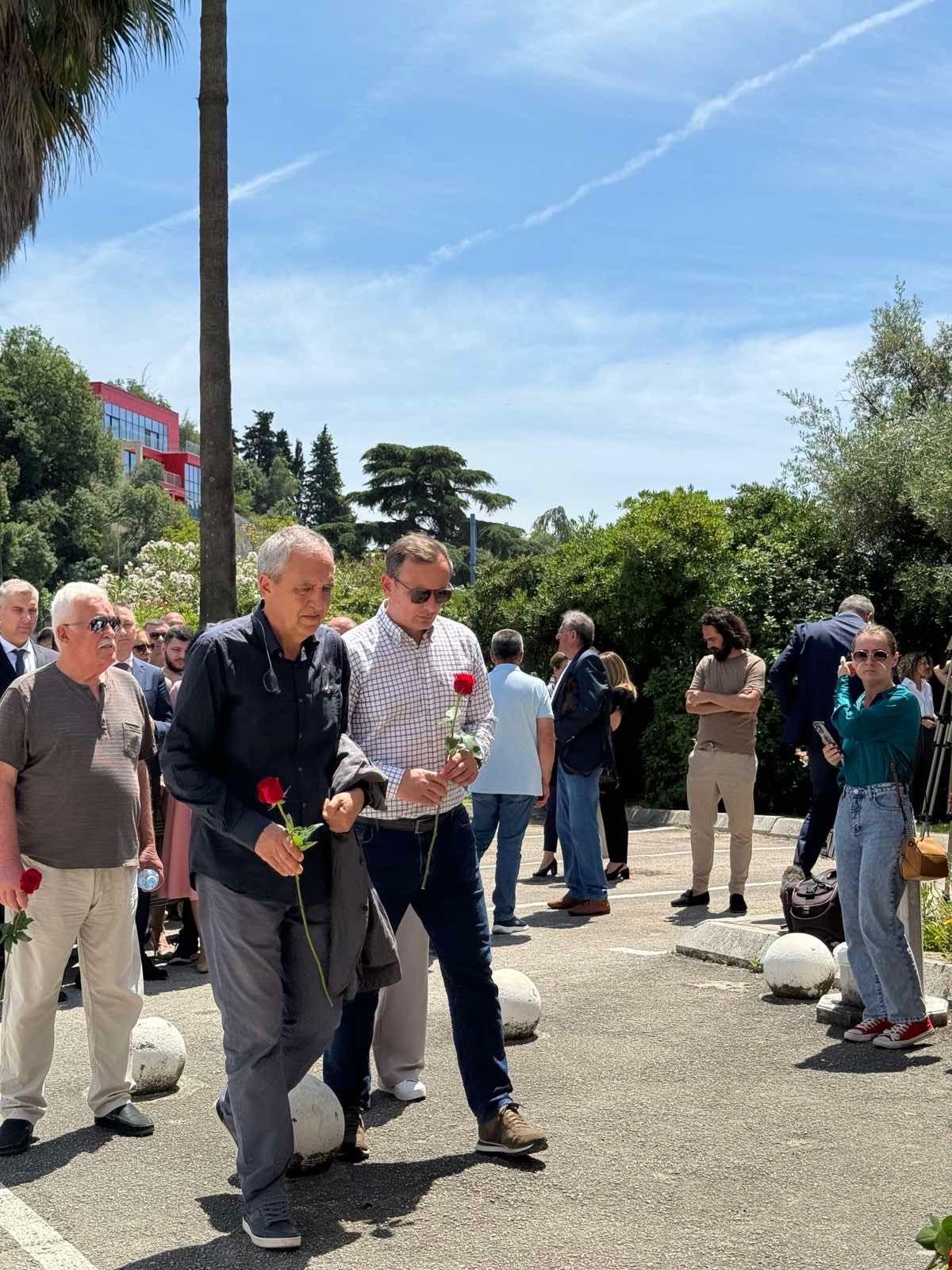
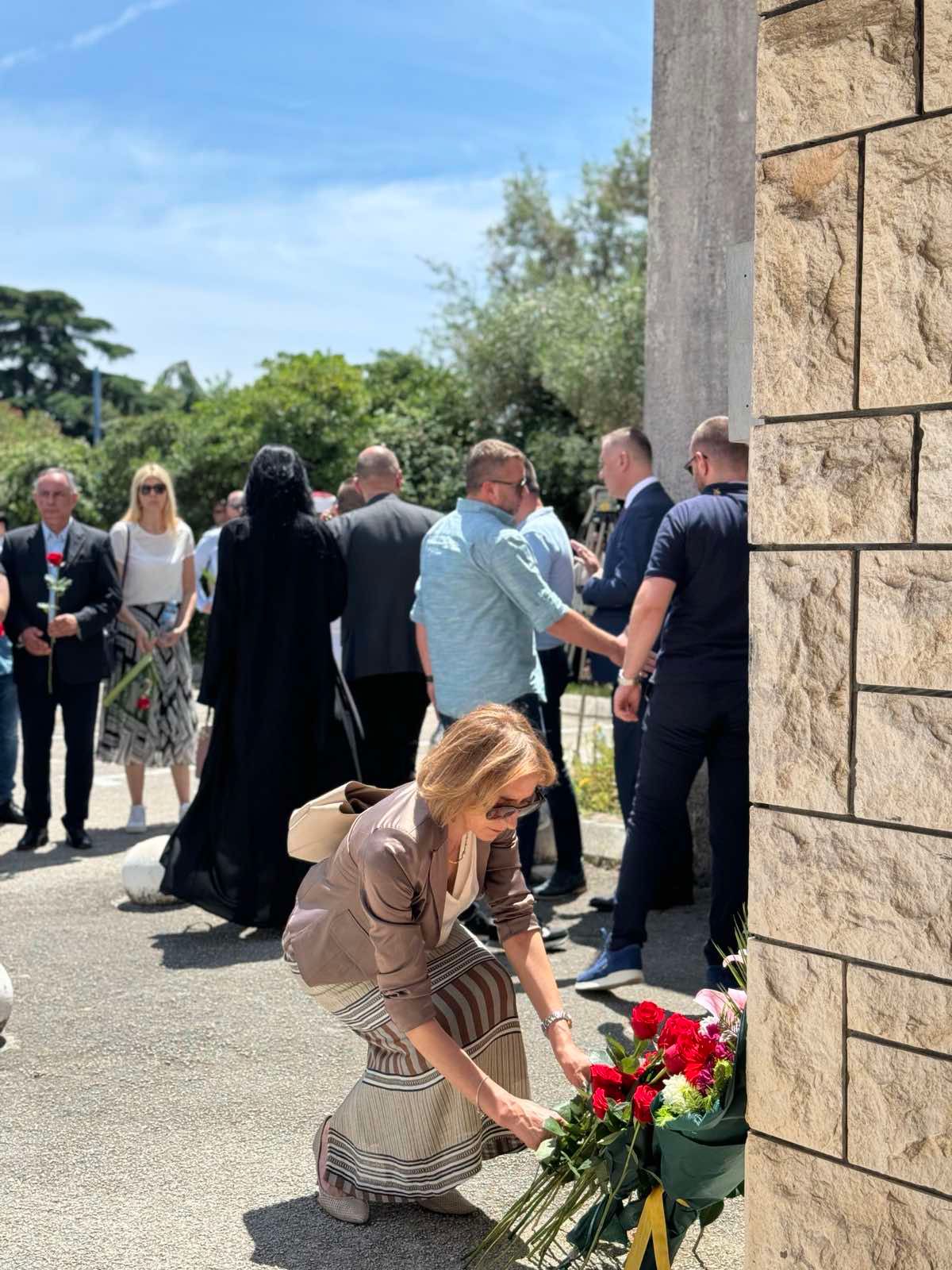
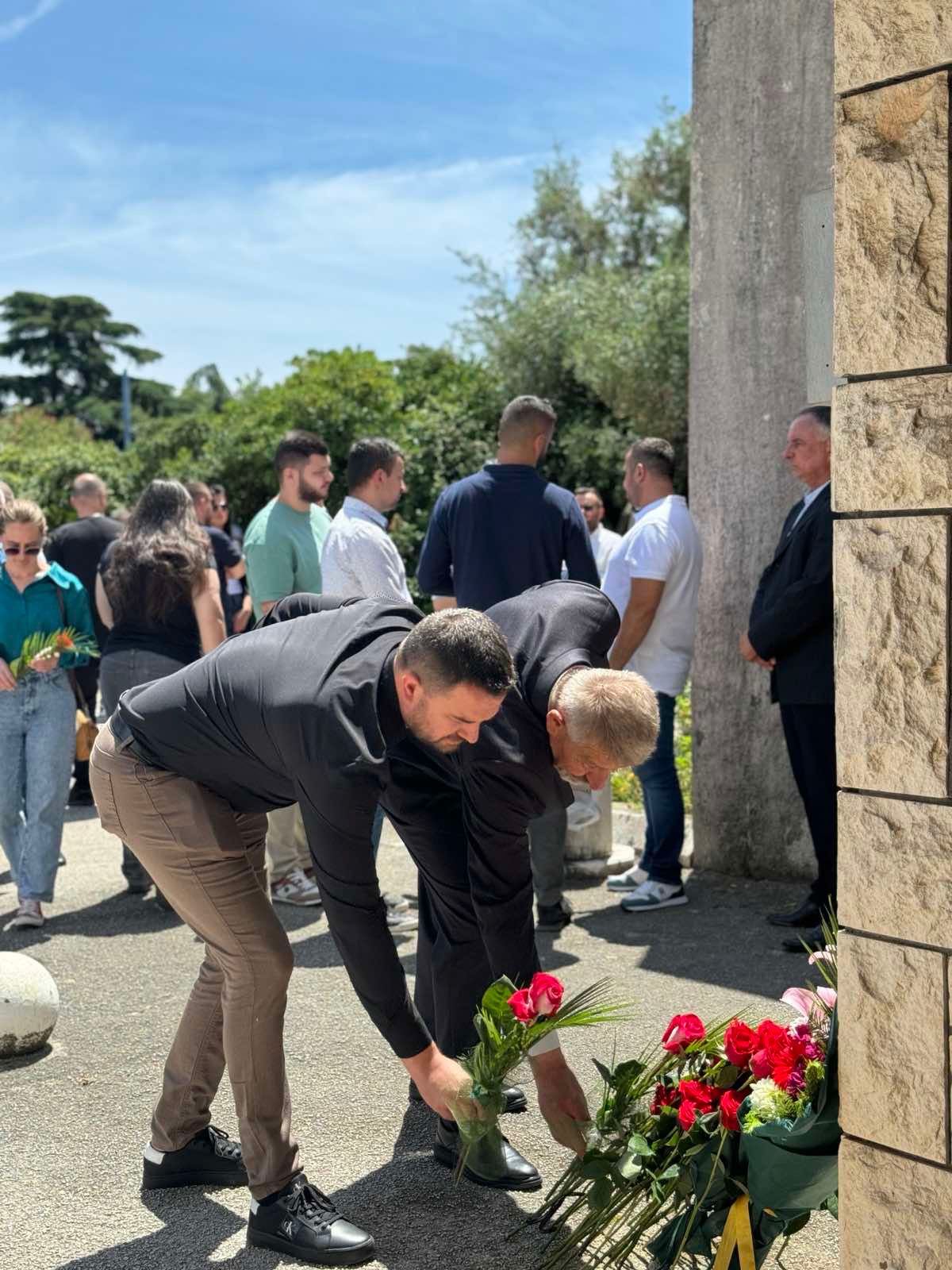
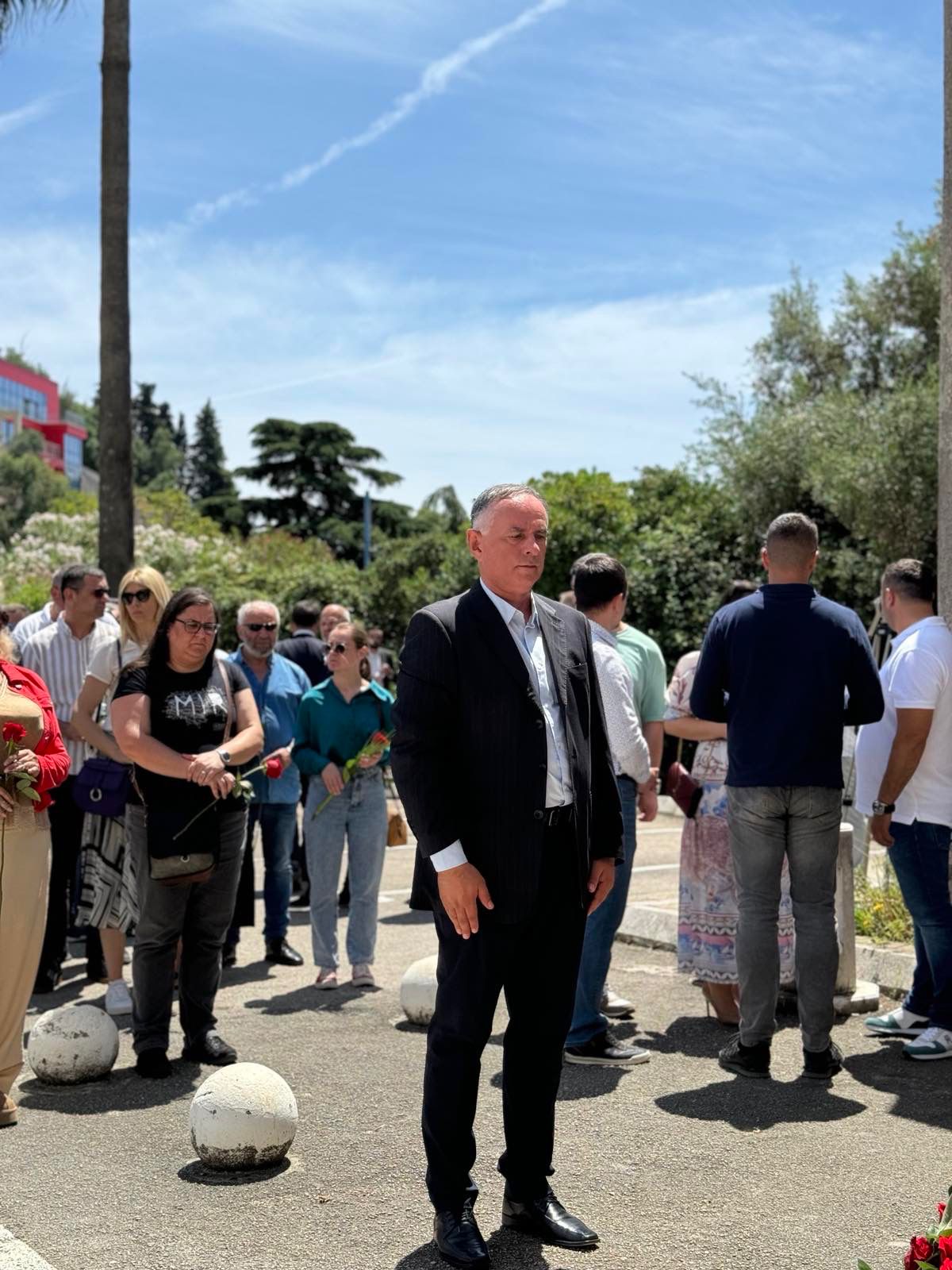
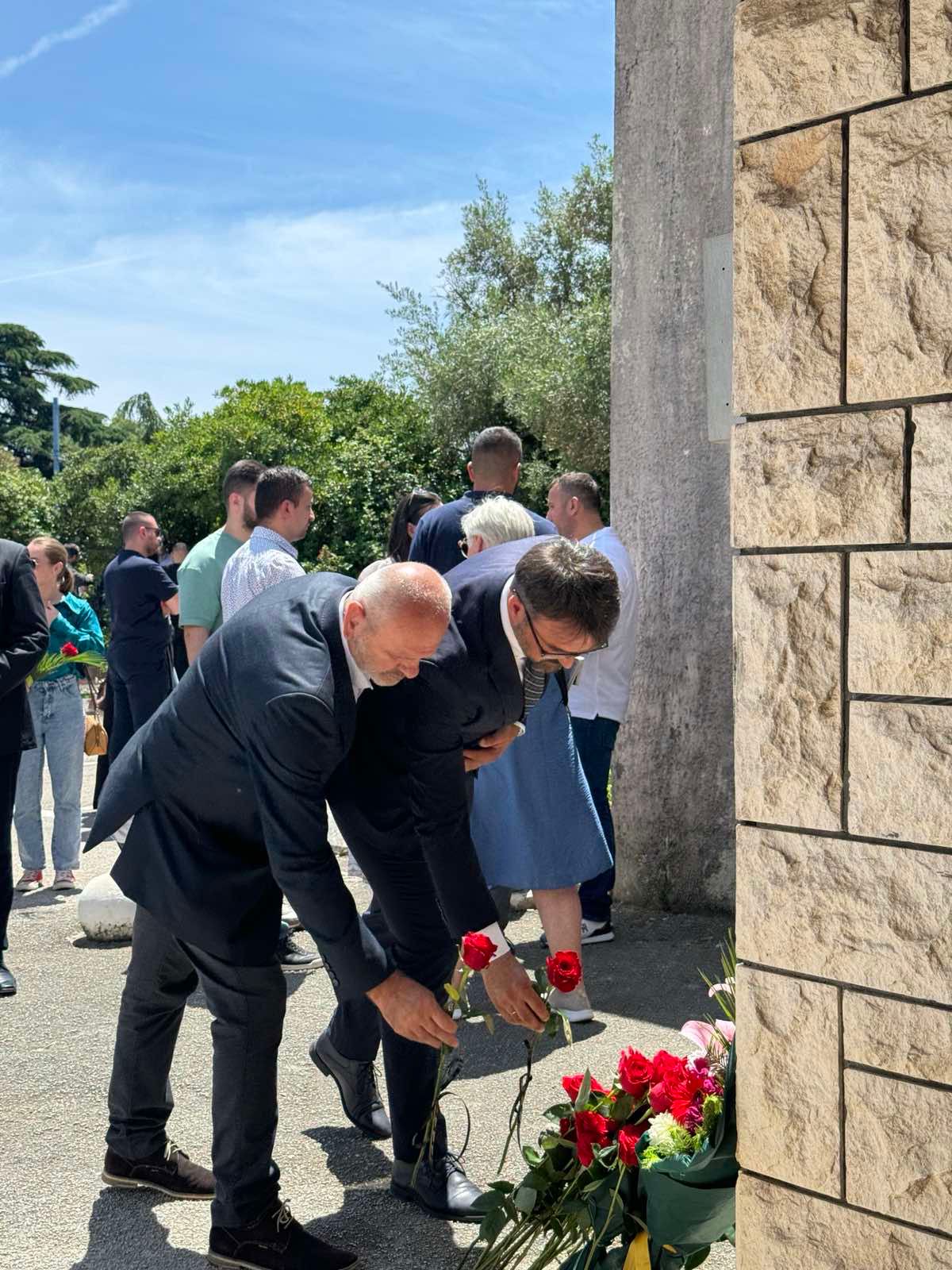
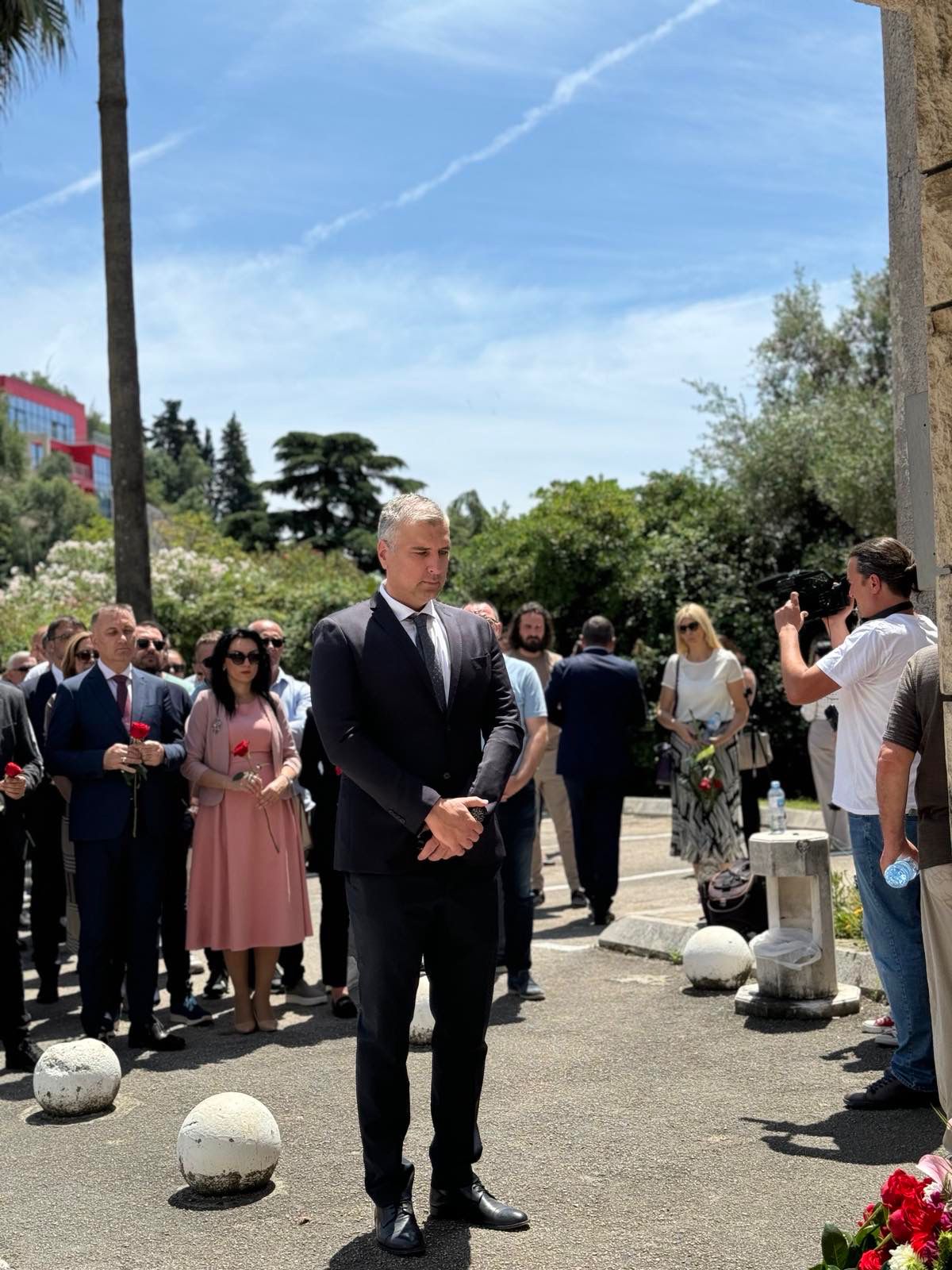
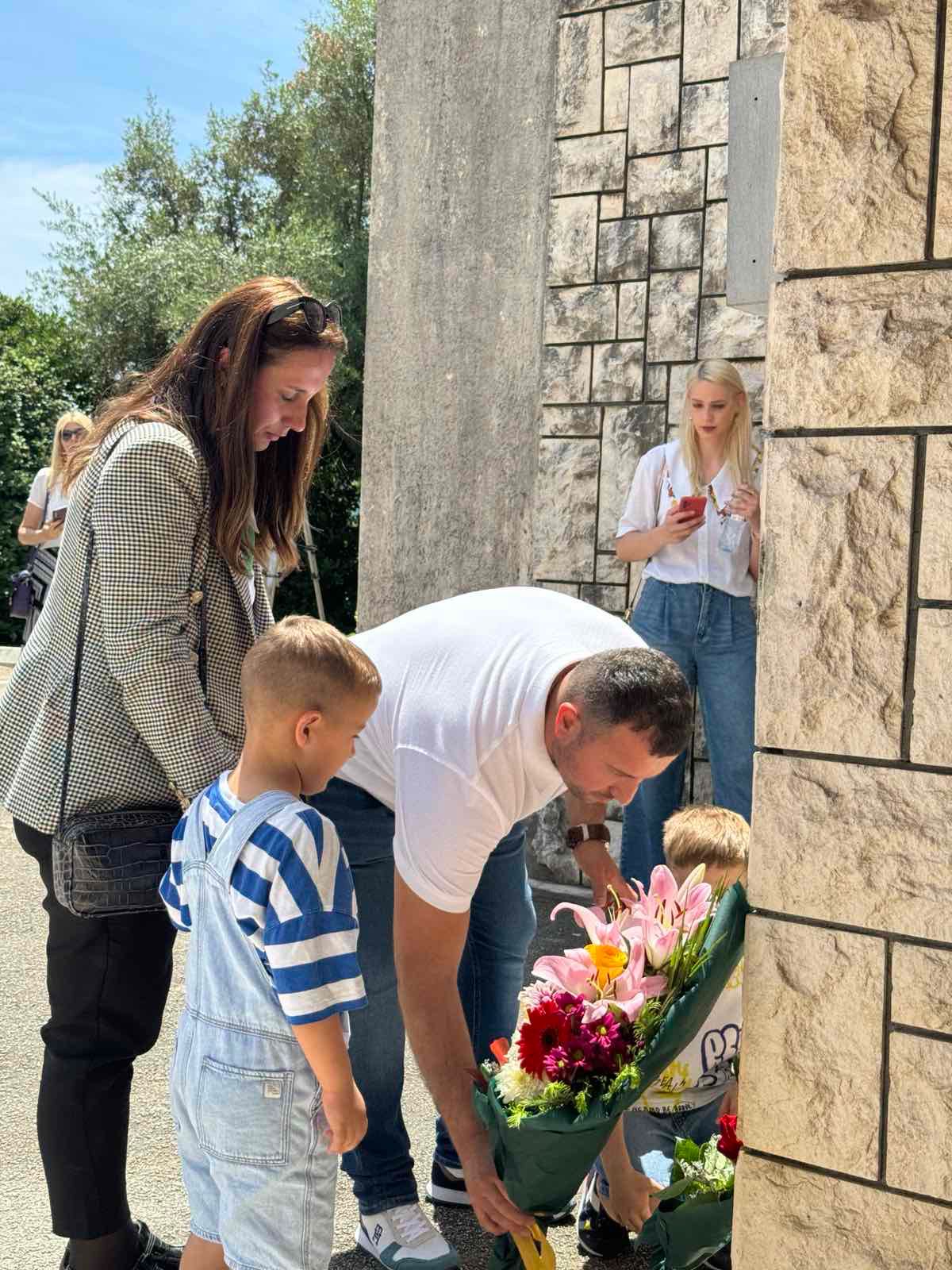
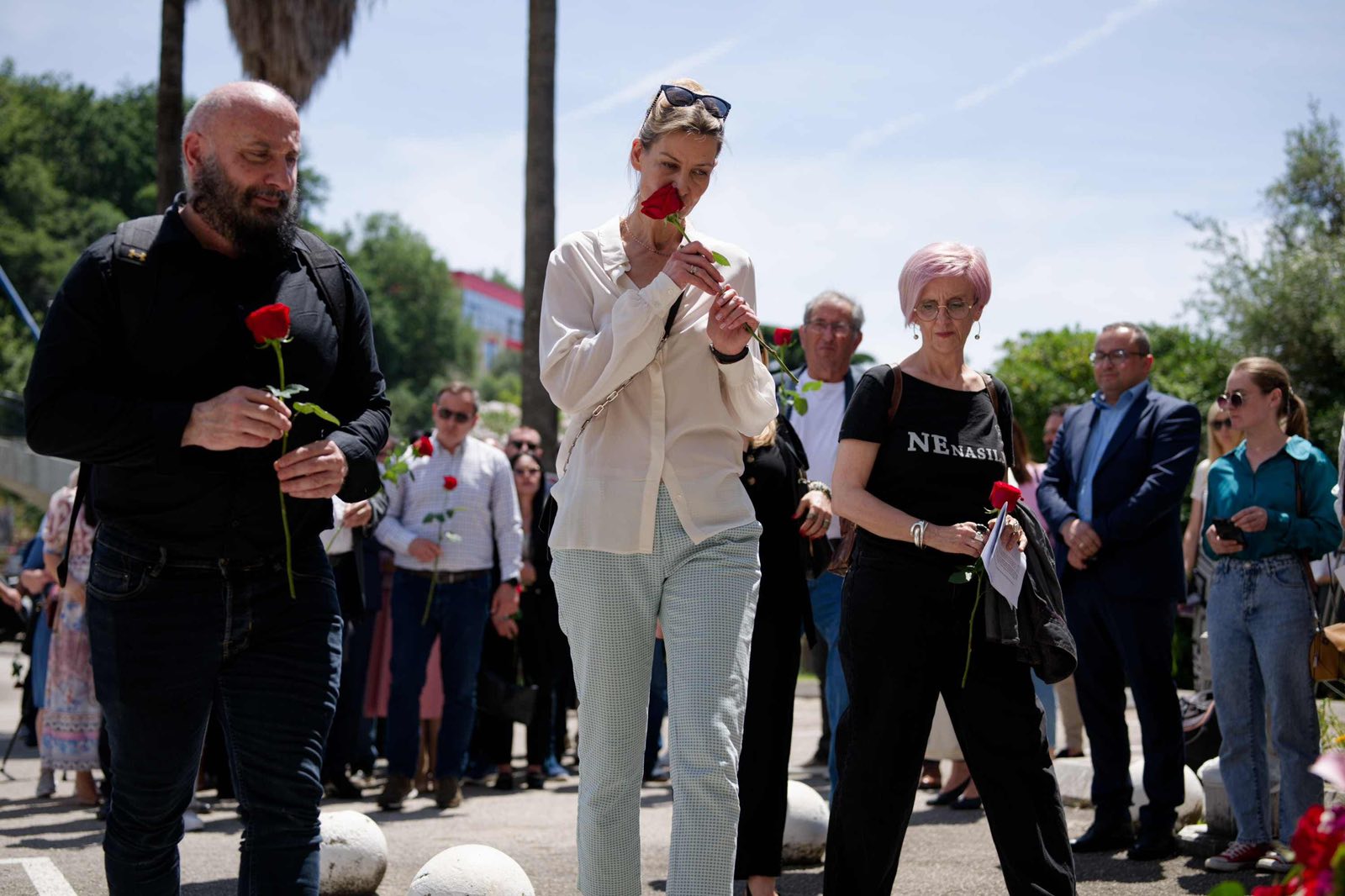
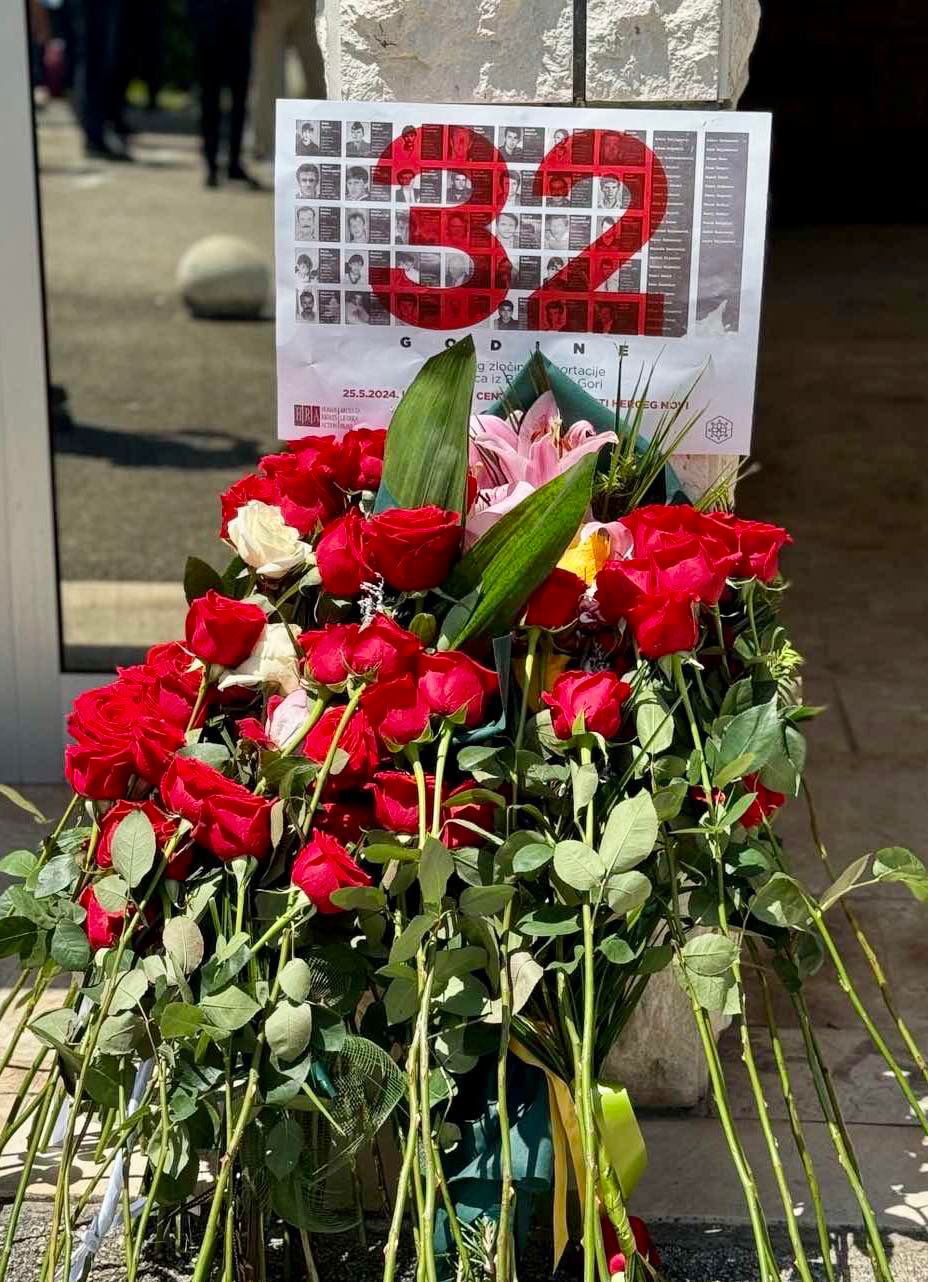
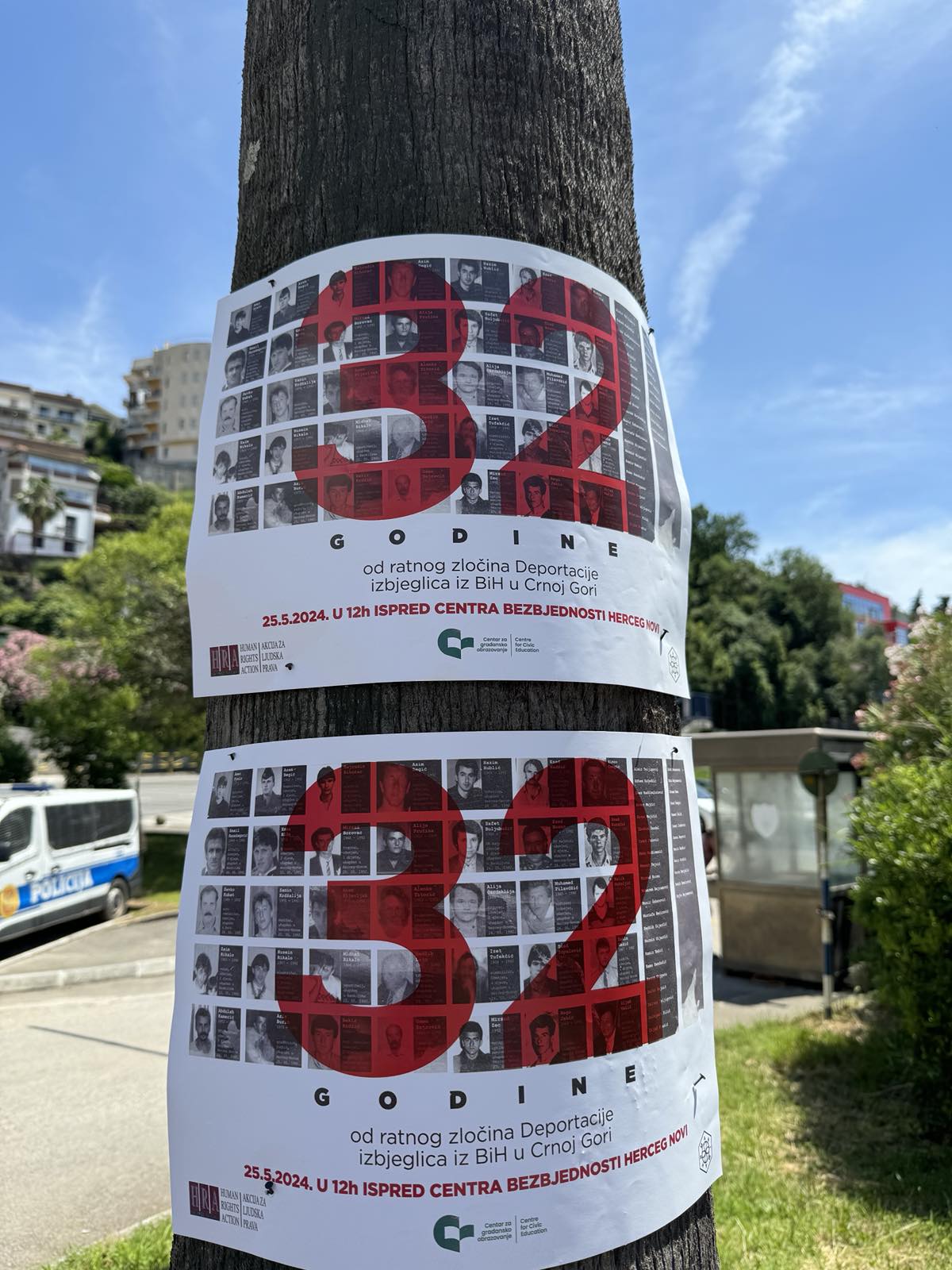
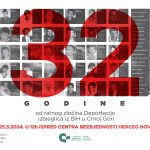
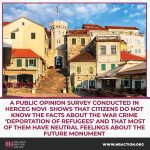
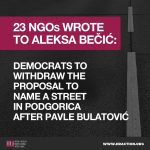
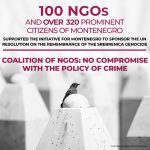

 English
English